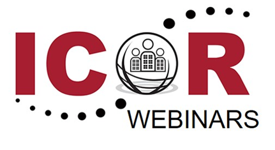
2024 ICOR Road to Resilience Learning Series
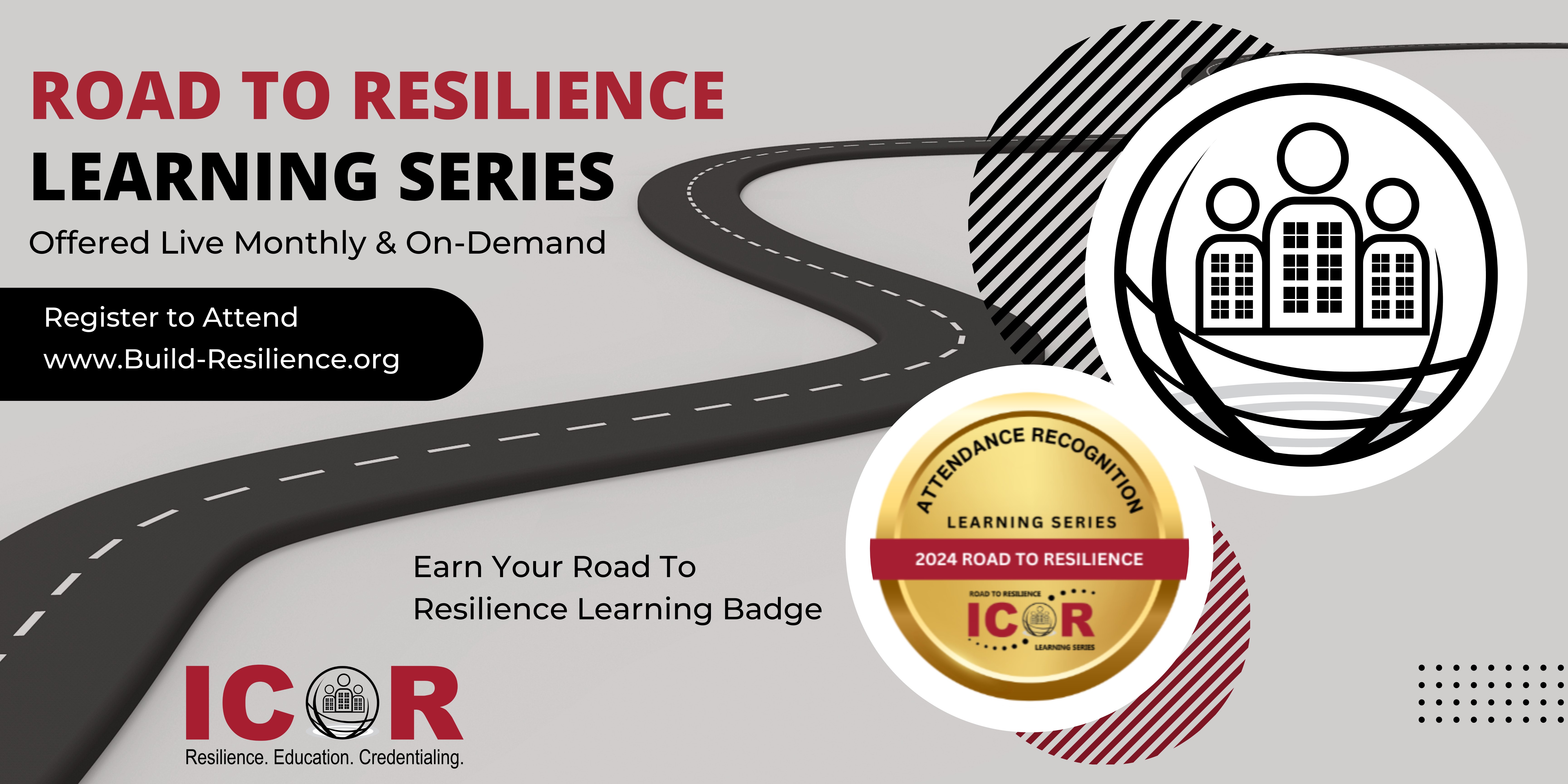
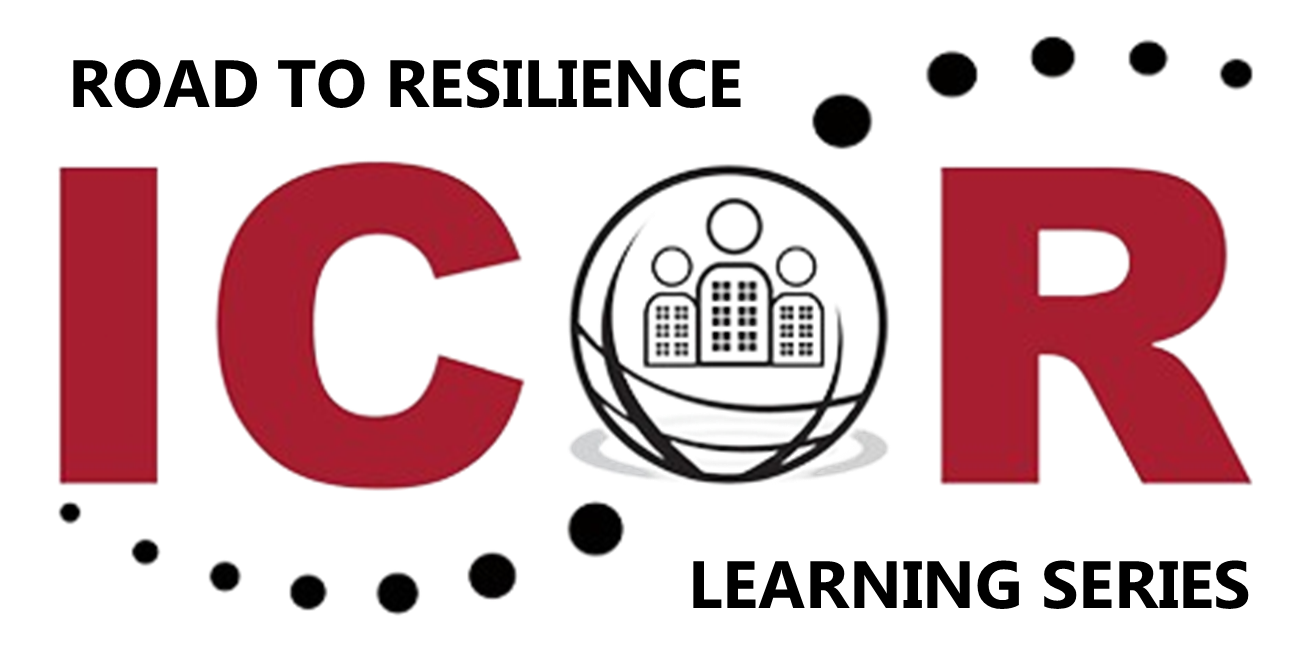 ICOR’s 2024 monthly webinars are focused on different aspects of the Road to Resilience. New this year! Participants have the opportunity to earn their Road to Resilience “Badge” by attending a minimum of 10 sessions of the learning series either live or on-demand.
ICOR’s 2024 monthly webinars are focused on different aspects of the Road to Resilience. New this year! Participants have the opportunity to earn their Road to Resilience “Badge” by attending a minimum of 10 sessions of the learning series either live or on-demand.
ICOR Webinars are offered live and are available for 30 days to the public. After 30 days they are available On Demand for ICOR members. Not a member? Join ICOR today!
Each webinar is worth 1 continuing education hour. All webinars are scheduled for 12:00-1:00 PM CST / GMT 06:00 unless otherwise noted. Attendees who attend for a minimum of 35 minutes receive a certificate of attendance for 1 Hour / .1 CEU.
November 20, 2024 - Is This Where We Want to Be?
Is our workplace flexible, productive, and meet employee needs for collaboration?
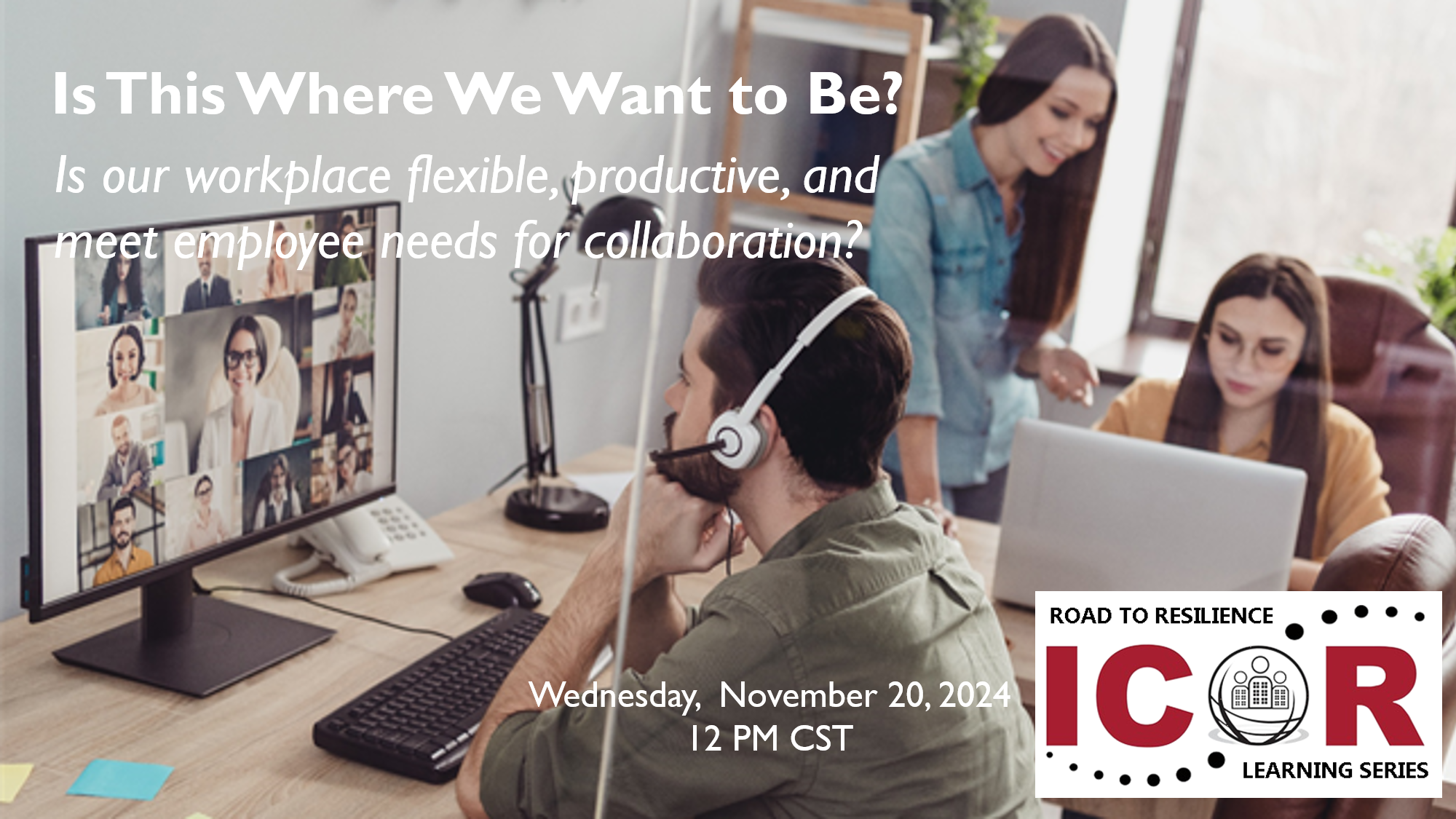
More and more organizations are adopting a flexible hybrid working model with a balance between office and remote work. This requires an understanding that while the roles can be virtual, certain activities are better done in person.
In an agile workplace, the organization understands how its people like to work, how often they need to interact with others, and how they do their best work. This understanding drives decision-making regarding where the work occurs.
Organizations should also consider the ability of the community(ies) where its facilities operate to meet its needs and expectations. The key questions that should be answered include, “To what extent does your community meet the needs of your organization? and, “Is your community able to provide necessary services?”
Attend this session to learn more about a flexible working model and inclusive collaboration as well as the importance of considering the resilience of the community where you work. We will help you answer the question, “How do we ensure we have the right people working on the right stuff in the right place?”
October 23, 2024 - Are We There Yet?
Measuring our performance - How are we doing?
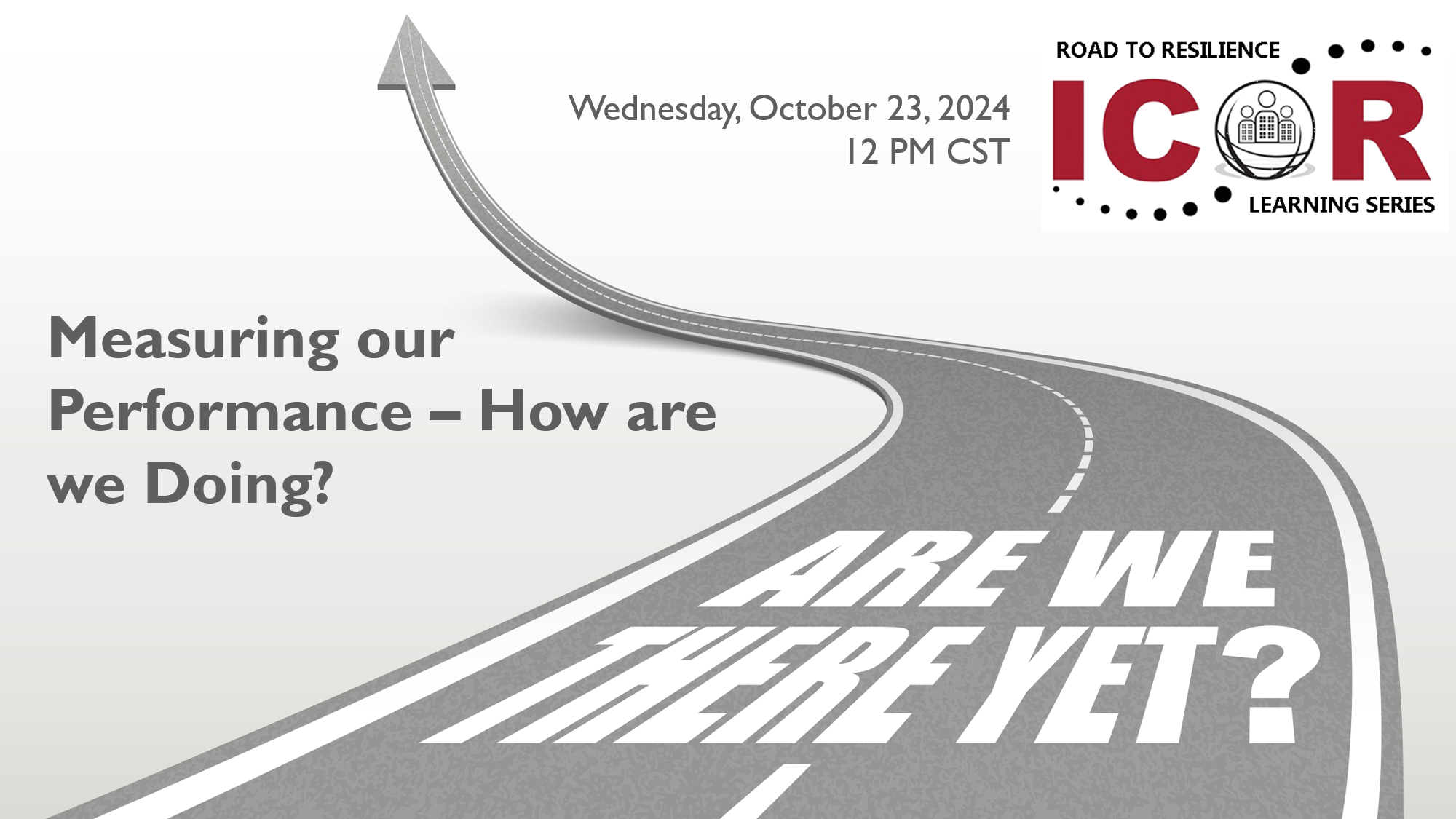
Because building resilience must be intentional, measuring your capabilities is an essential part of the journey. It is also impossible to implement strategic objectives effectively without having the ability to measure your current state and where you need to strengthen those capabilities – or to determine what is and what is not working.
The organization should encourage and create a culture of continual improvement across all parts of the organization and commit to validate and continually improve its organizational resilience activities and capabilities.
Attend this session to gain an understanding of how to promote a mindset of continuous improvement by leveraging agile performance management. We will help you answer the question, “How can improve how we evaluate our performance?”
September 26, 2024 - What Have We Learned So Far on our Journey?
We need to stop and smell the roses! Or at least share how things are going.

In more resilient organizations, knowledge and information is recognized as a critical resource of the organization. The organization values information, knowledge and learning. Learning from experience and from each other is encouraged.
They encourage the creation and sharing of lessons learned about success and failure and promote the adoption of better practice. They encourage their people to communicate their ideas both vertically and horizontally in the organization and to share knowledge and information in a timely manner to enable effective decision-making.
Attend this session to gain an understanding of how to promote a mindset of continuous learning. We will help you answer the question, “How can I foster and environment of open communication that provides opportunities for learning and sharing knowledge?”
August 28, 2024 - The Road We’re on is Very Risky! Are We Strong Enough to Continue the Journey?
Have we considered all the ways our journey can be disrupted?

Organization’s should identify and implement systems to anticipate, plan, and respond to recognized and emerging risks so that they individually and collectively contribute to the organization's purpose and the protection of what it values - eliminating siloes.
More resilient organizations ensure that its systems that manage risk are sufficiently robust and effective to respond to changes. They have the capability to consistently deliver on their commitments under changing circumstances and to adapt their operations to effectively manage risk.
Attend this session to understand how to increase preparedness and reduce risk. We will help you answer the question, “How can I ensure that I am reducing risk for my organization?
July 31, 2024 - Do I Have the Energy to Continue on This Journey?
The resilience of your workforce impacts the organization’s ability to deliver on its resilience strategy and objectives.
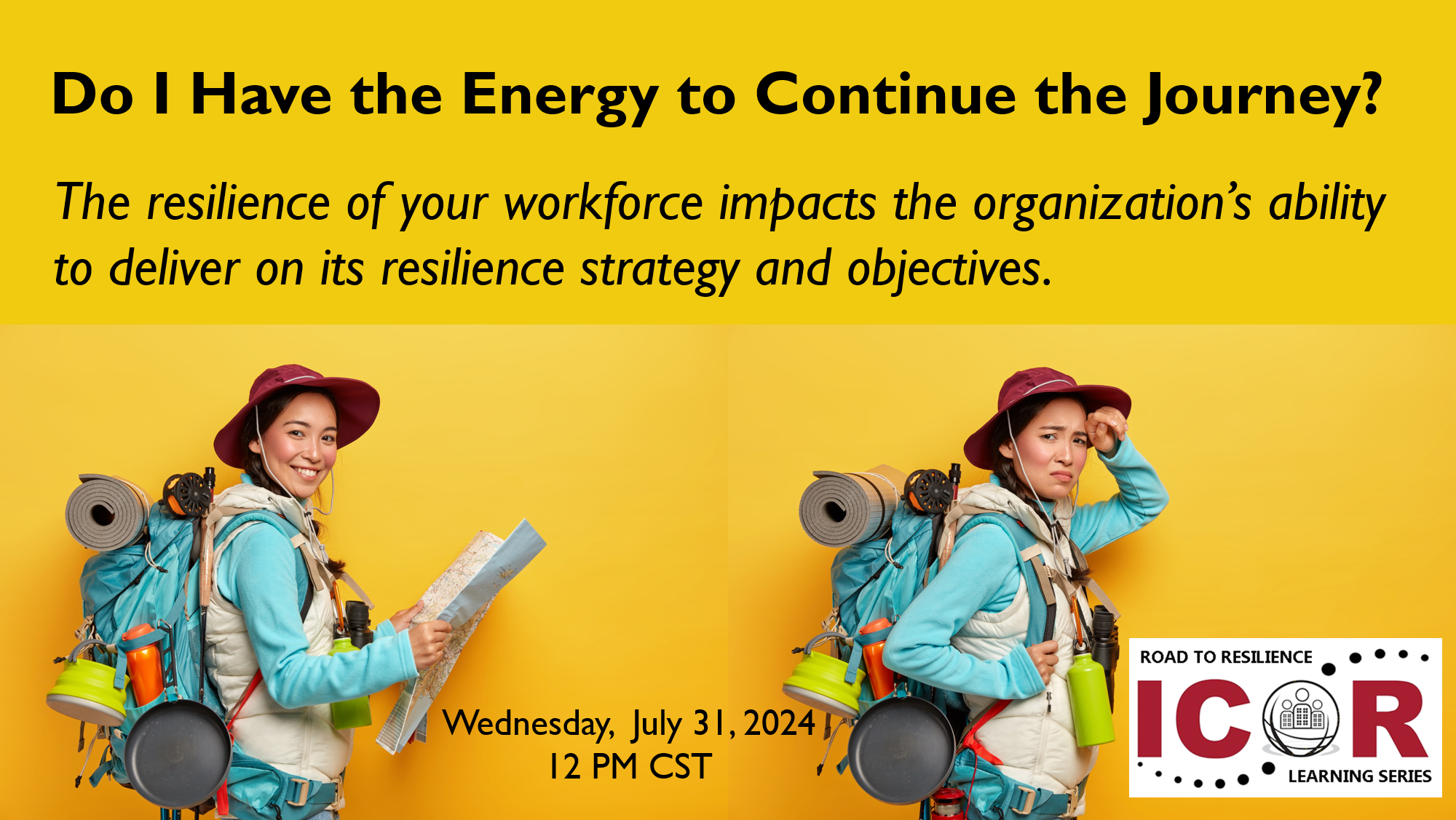
More resilient organizations implement systems to increase workforce capacity to handle stress, increase engagement, and manage during times of continuous change. Resilient employees embody health on multiple levels. They avoid illness, maintain productivity and operate with mental toughness.
The relationship between resilience, stress, and competitive advantage in today’s marketplace, makes it imperative that leaders understand how to increase the resilience of their workforce. In a resilient workforce, continuous change ceases to be debilitating and becomes fuel for continuous performance improvement.
Attend this session to understand the importance of increasing the resilience of your employees. We will help you answer the questions, “Does our organization reward and recognize performance? Do we nurture and retain talent? Do we reduce stress and provide opportunities for learning?”
June 26, 2024 - How Do We Continue on the Journey When the Road is Under Construction?
Change happens. How do you manage during times of uncertainty?
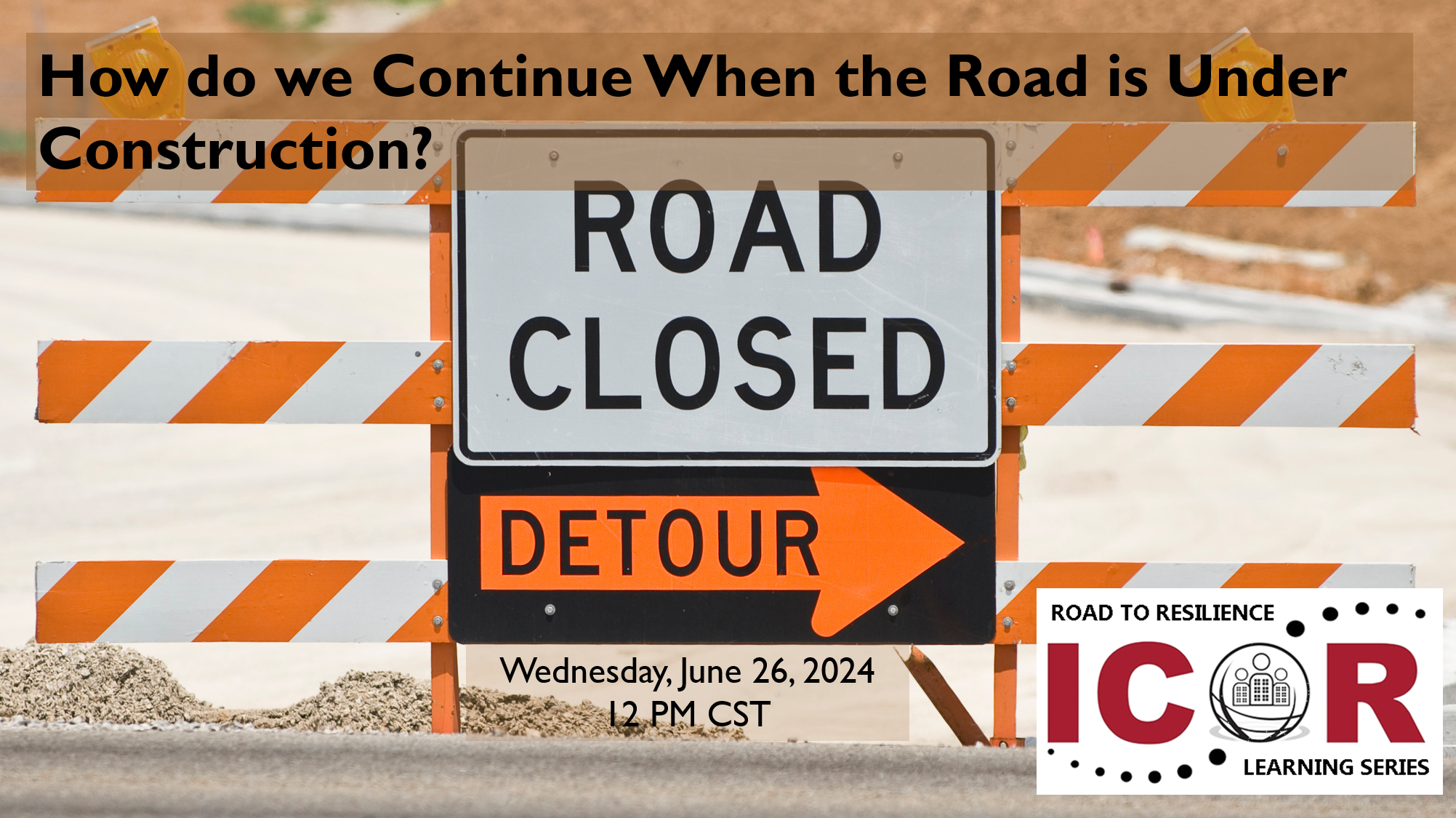
More resilient organizations build both agile and flexible systems that enable them to respond faster to changing conditions, to improve efficiency, and enhance customer satisfaction. More resilient organizations are structured and designed for both high performance and managing change.
It allows those responsible for responding to and managing an incident to switch from one design to another if needed in order to work in a more agile and flexible manner.
Attend this session to gain an understanding of the impact of your organization’s structure and design and how to implement agile ways of working wherever possible. We will help you answer the question, “How can I operate in a more agile manner and successfully manage change?”
May 22, 2024 - Are You Enjoying Your Resilience Journey?
Is your organization’s culture a source of risk or a strength on this journey?
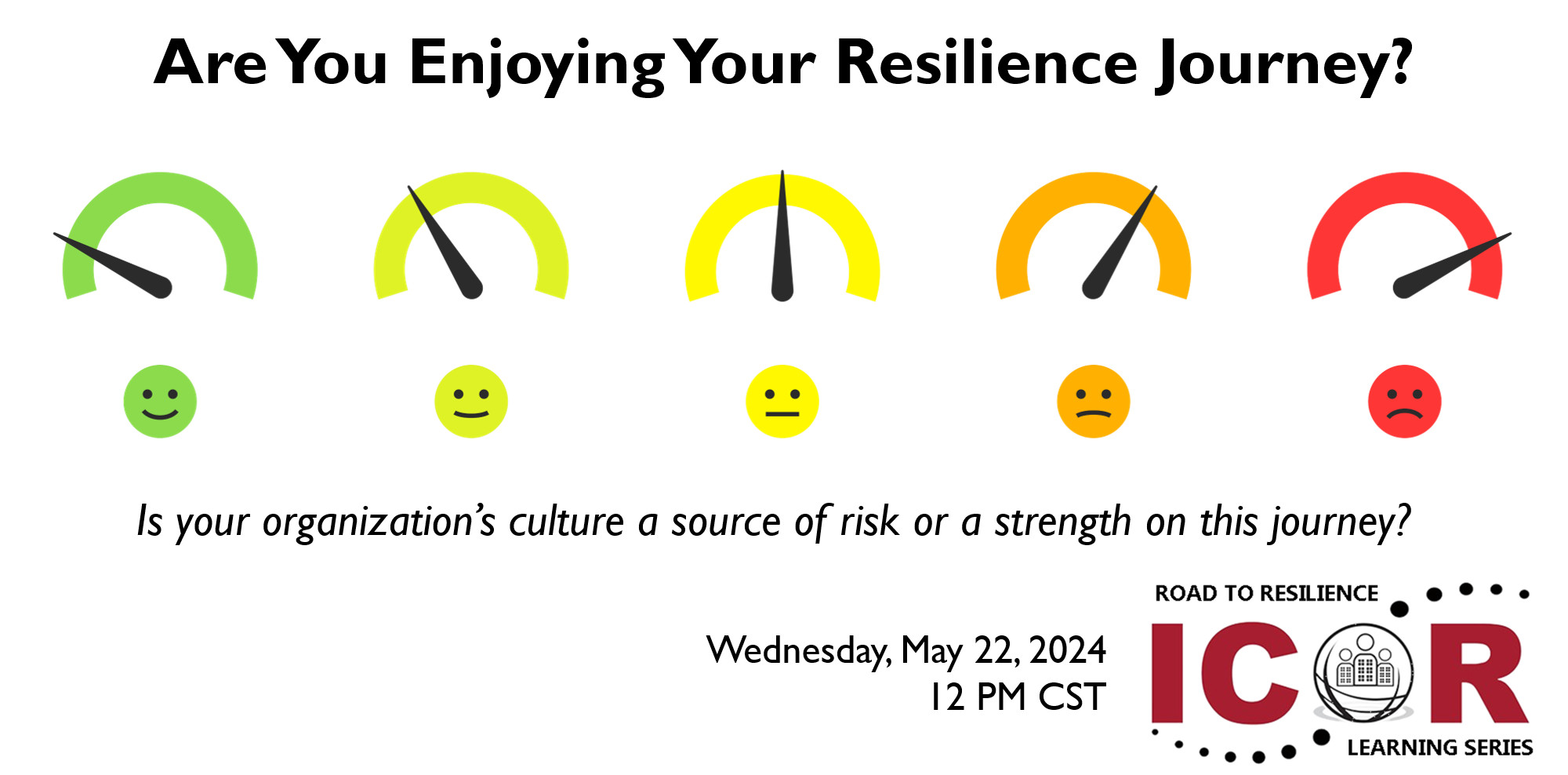
An organization’s culture governs how management, employees and stakeholders behave, act, and perform their jobs. Culture is often expressed in members’ self-image, inner workings, and future expectations.
It’s how individuals identify themselves with an organization. It illustrates how a team can work towards achieving desired goals. Culture is what enables a competitive advantage to sustain and grow over time – or what derails it.
Attend this session to gain an understanding of what is required to ensure you have a culture that can successfully manage during times of constant change and uncertainty. We will help you answer the question, “What is my role in strengthening my organization’s culture?”
April 17, 2024 - Are We All on the Same Road to Resilience?
We need to all be following the same map!
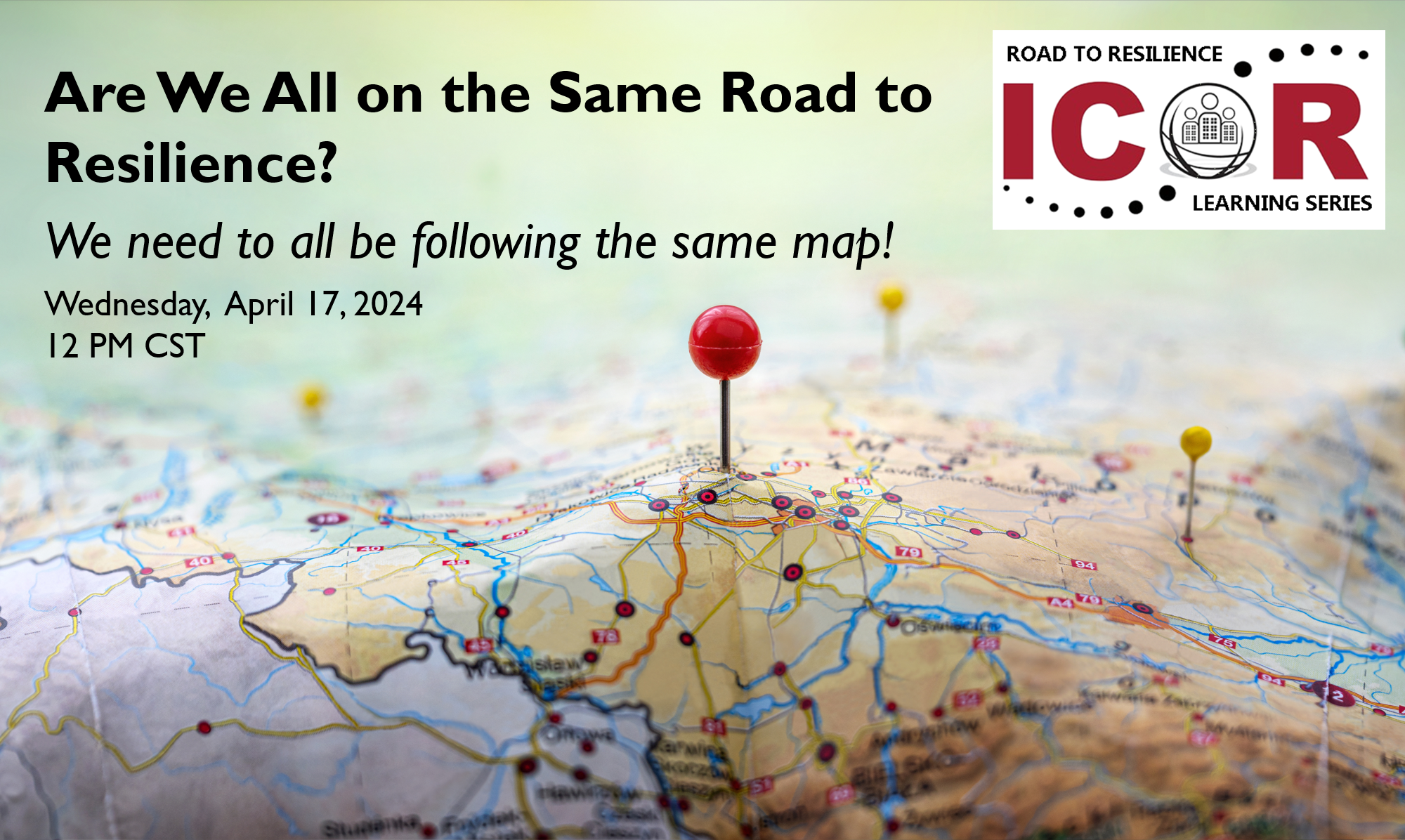
More resilient organizations know who they are and what they stand for. A shared purpose is the “glue” that holds the organization together. Purpose helps attract people to join an organization, remain there, and to thrive.
Organizational resilience is enhanced when there is a clearly articulated and understood purpose, vision, and values that provide clarity to decision-making and activities at all levels of the organization.
Attend this session to learn how having a strong identity is an essential aspect to building a more resilient organization and serves as a tool that unites the organization’s people around its purpose. We will help you answer the question, “Why should I be part of the journey?”
March 27, 2024 - Who is Leading? Who are we Following?
Are our leaders trusted and respected, and do they act with integrity?

The behavior of an organization’s leaders is a key contributor to how it determines and implements its resilience strategies. Building a more resilient organization requires leaders who develop and encourage others to lead under a range of conditions and circumstances, including during periods of uncertainty and disruptions.
Attend this learning session to gain an understanding of the attributes, capabilities, and behaviors required for those leading in increasing an organization’s resilience. We will help you answer the question, “How can I be a better leader in resilience?”
February 28, 2024 - Train, Plane, or Automobile? How Are We Traveling on the Road to Resilience?
Leadership & governance required to begin the journey
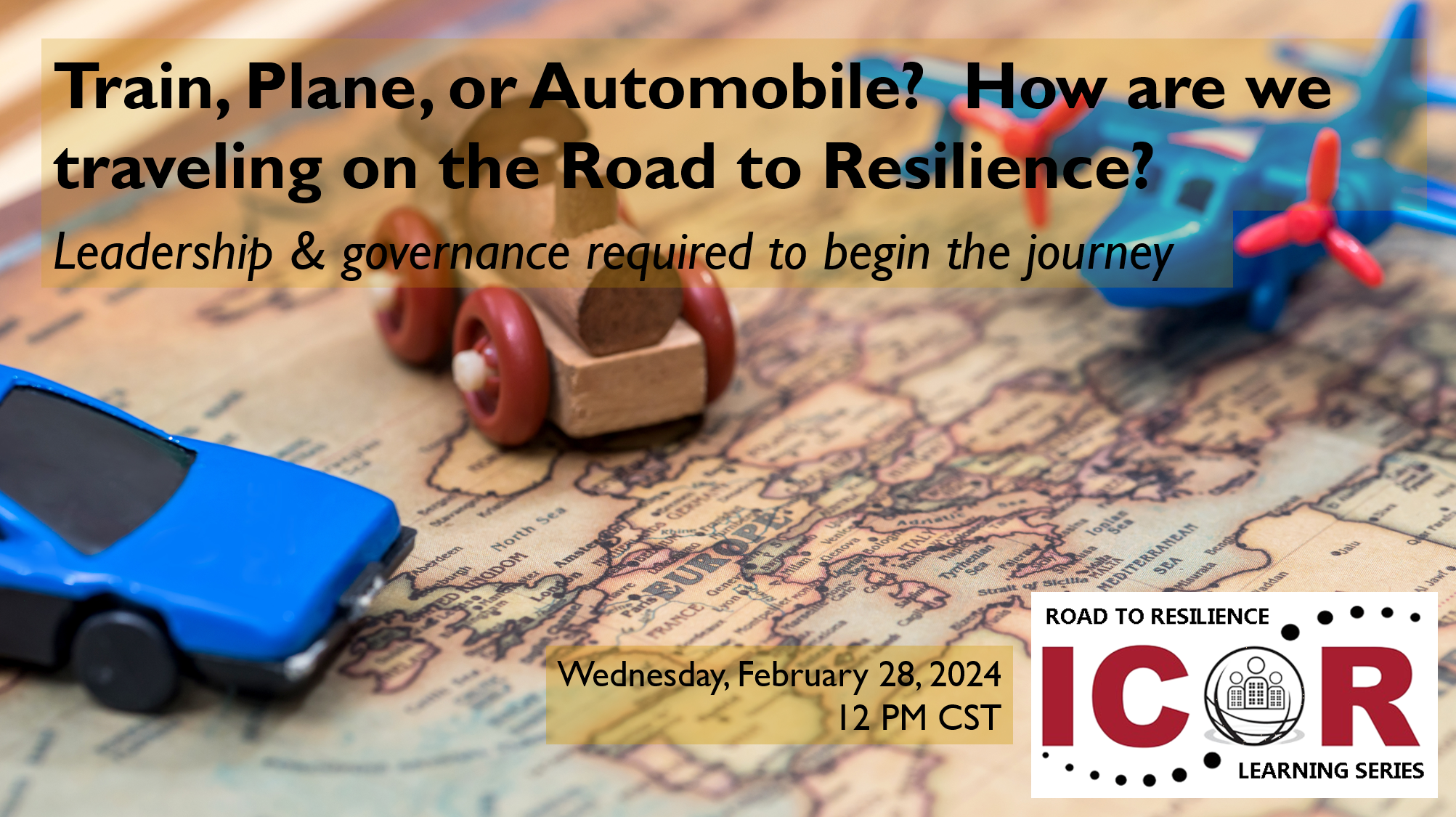
Top management is responsible for the governance and accountability of building the organization's resilience capability. They should determine the strategy and objectives for organizational resilience and develop measurement criteria to be used to monitor and evaluate the status of the organization resilience attributes, capabilities, and behaviors.
Enhancing resilience should be a strategic organizational goal, and as such, the organization's leaders must be committed to a sustained focus on organizational resilience.
Attend this learning session to understand what is required by top management to build a more resilient organization. We will help you answer the question, “What should be the focus of our resilience strategy?”
January 24, 2024 - What Do We Need to Travel Down the Road to Resilience?
Introduction to the Road to Resilience Learning Series
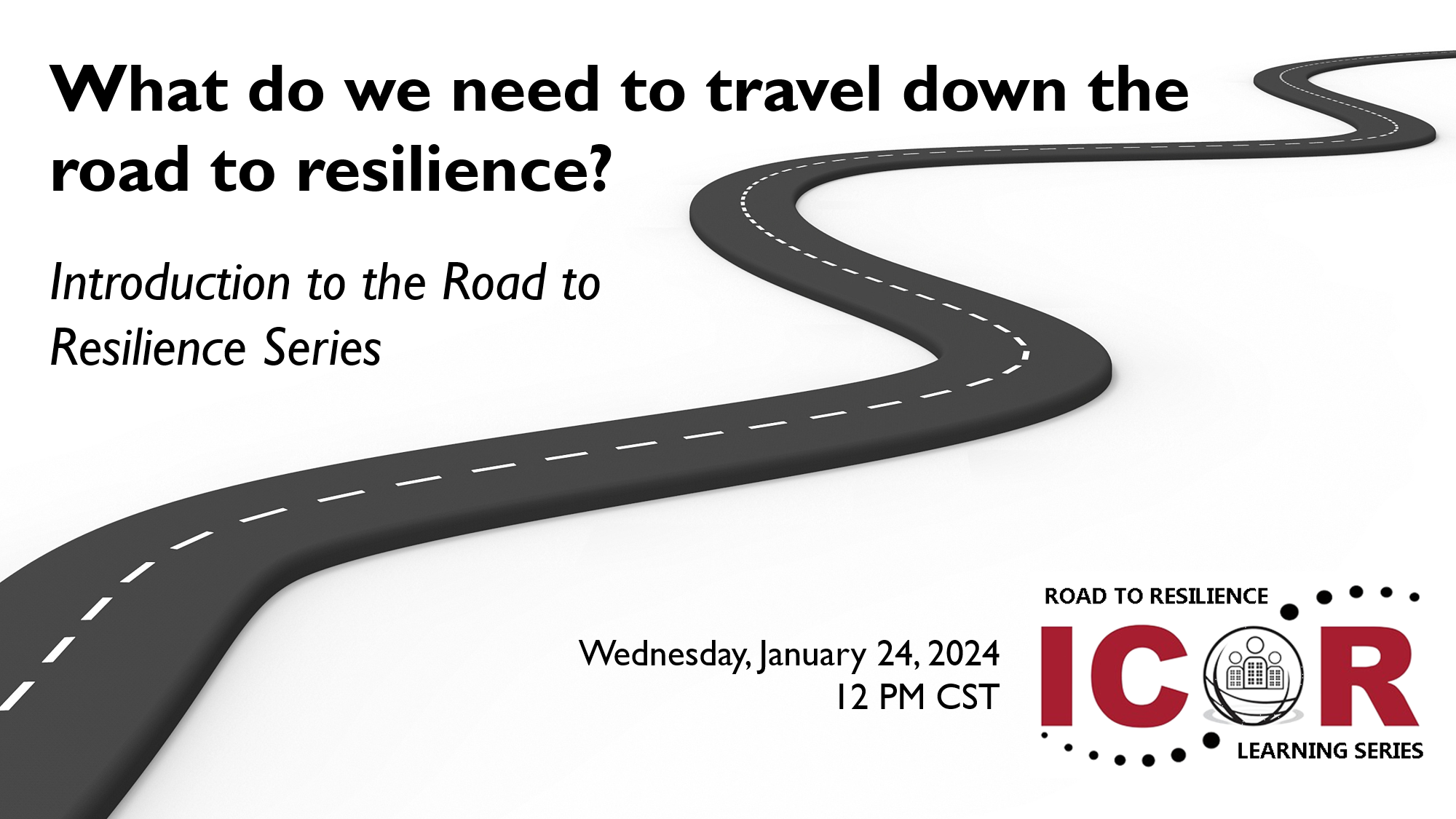
Organizations face the increasing challenge of managing change at a rate not seen before, while also experiencing crises that occur more often, last longer, are more complex, and have the potential to significantly impact the organization’s survival.
Being able to respond both quickly and effectively to change and uncertainty is a capability required of all organizations. We must learn to adapt in the face of diverse challenges – to build their resilience in an uncertain world.
Attend this learning session to gain an understanding of ICOR’s resilience frameworks and models as well as to review the results of ICOR’s 2023 Snapshot Assessment of Resilience Strategies, Capabilities, & Behaviors. This session serves as the kick-off for the 2024 series.
October 25, 2023 - Successful Implementation of the Facility Operations Maturity Model (FOMM) for Data Centers
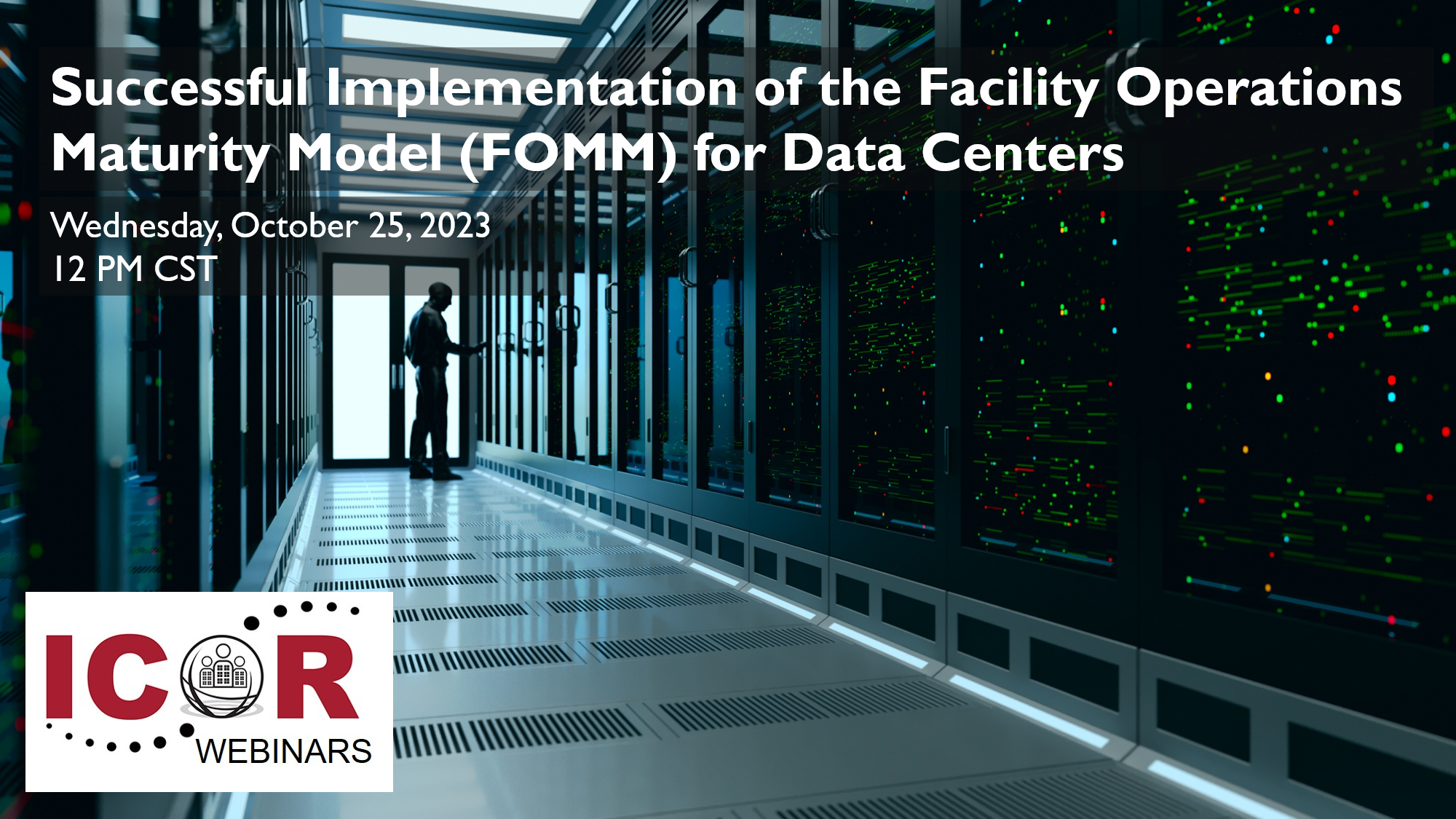
Having an operations & maintenance (O&M) program with written procedures and effective people training, determines to a large degree how well a data center lives up to its design intent.
The Facility Operations Maturity Model (FOMM) is a useful method for determining how effective that program is, what might be lacking, and for benchmarking performance to drive continuous improvement throughout the life cycle of the facility.
Attend this webinar and learn from experts from Top Tier Infrastructure in Brazil who will use a case study approach to share the most common findings of this assessment.
September 27, 2023 - ITIL 4 & Risk Management
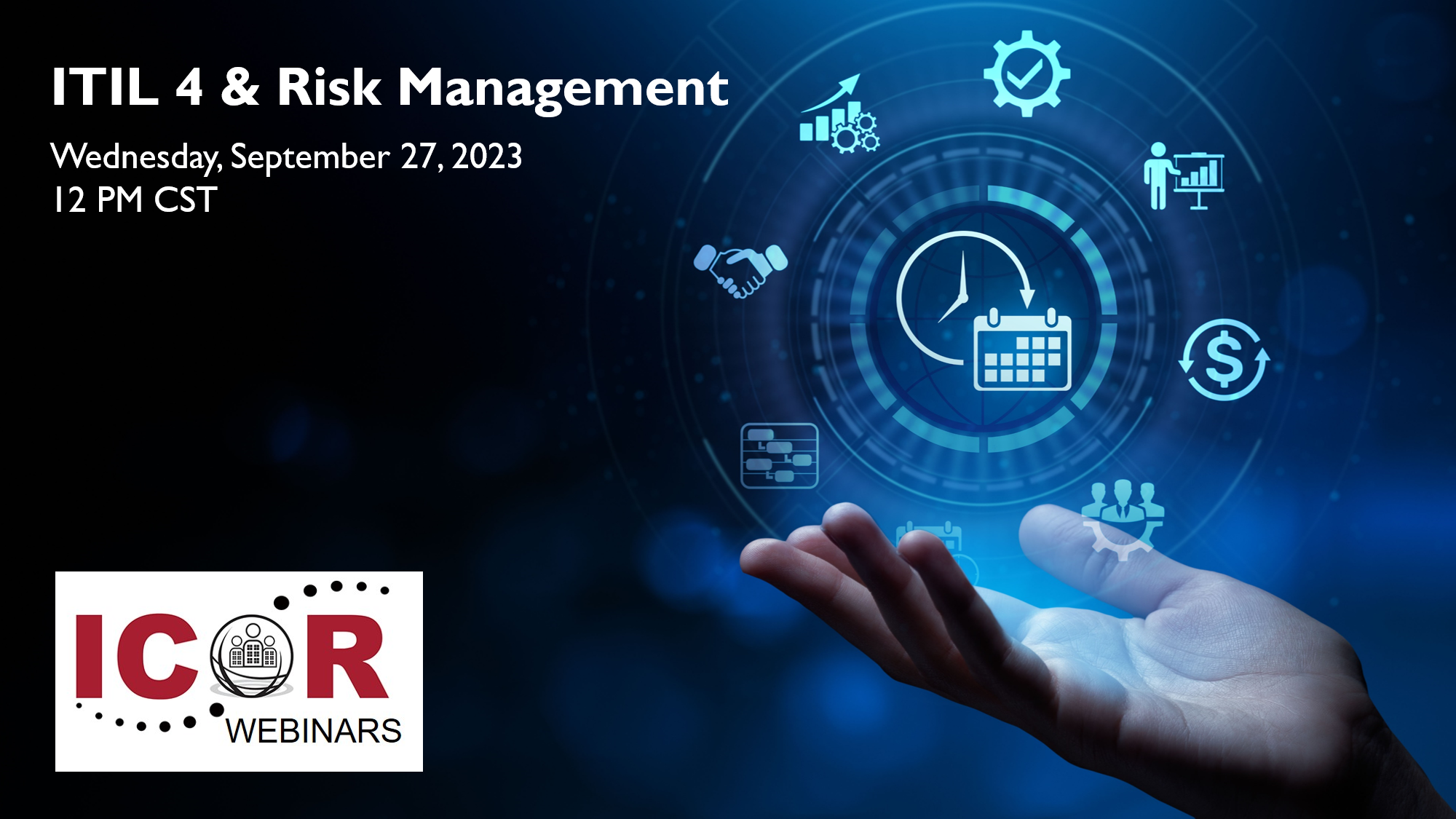
Managing risk is an essential aspect of creating value in an IT service management (ITSM) environment. Implementing and controlling risk in an ITSM environment is not only a good business practice, it can also be a regulatory requirement.
Attend this webinar to learn about managing risk referencing the ITIL 4 Practice Guide (2020).
August 23, 2023 - A Consulting Firm’s Road to Resilience
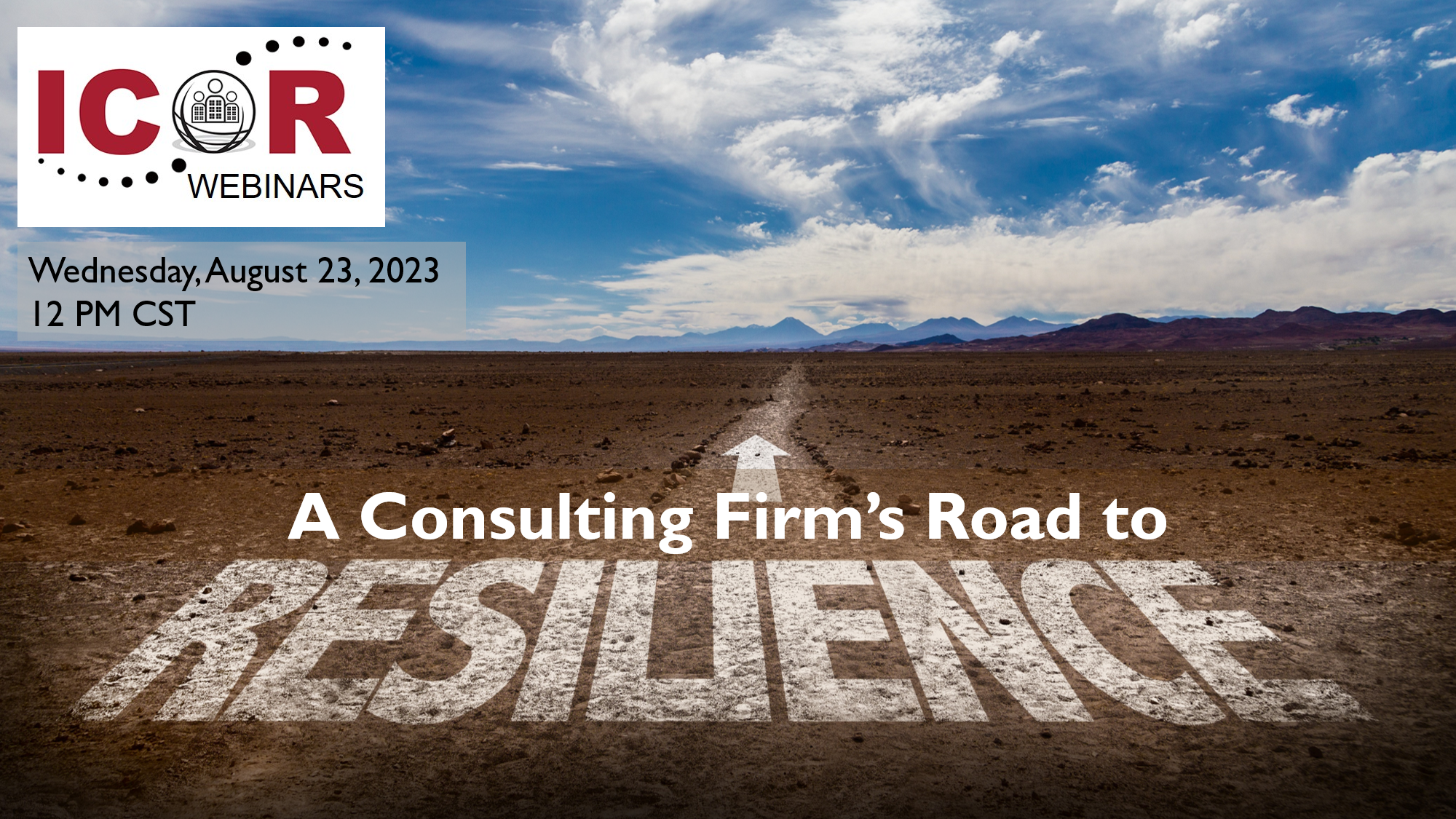
Yves Dávila shares how this consulting firm has implemented strategies to increase resilience. Yves is the Executive Director and Regional Leader of the business continuity practice at Protiviti Member Firm Peru SAC, a firm specializing in internal auditing, risk and business consulting.
Attend this webinar and learn how to implement strategies to increase resilience using an interactive question and answer approach.
July 26, 2023 - Developing Leaders in Turbulent Times
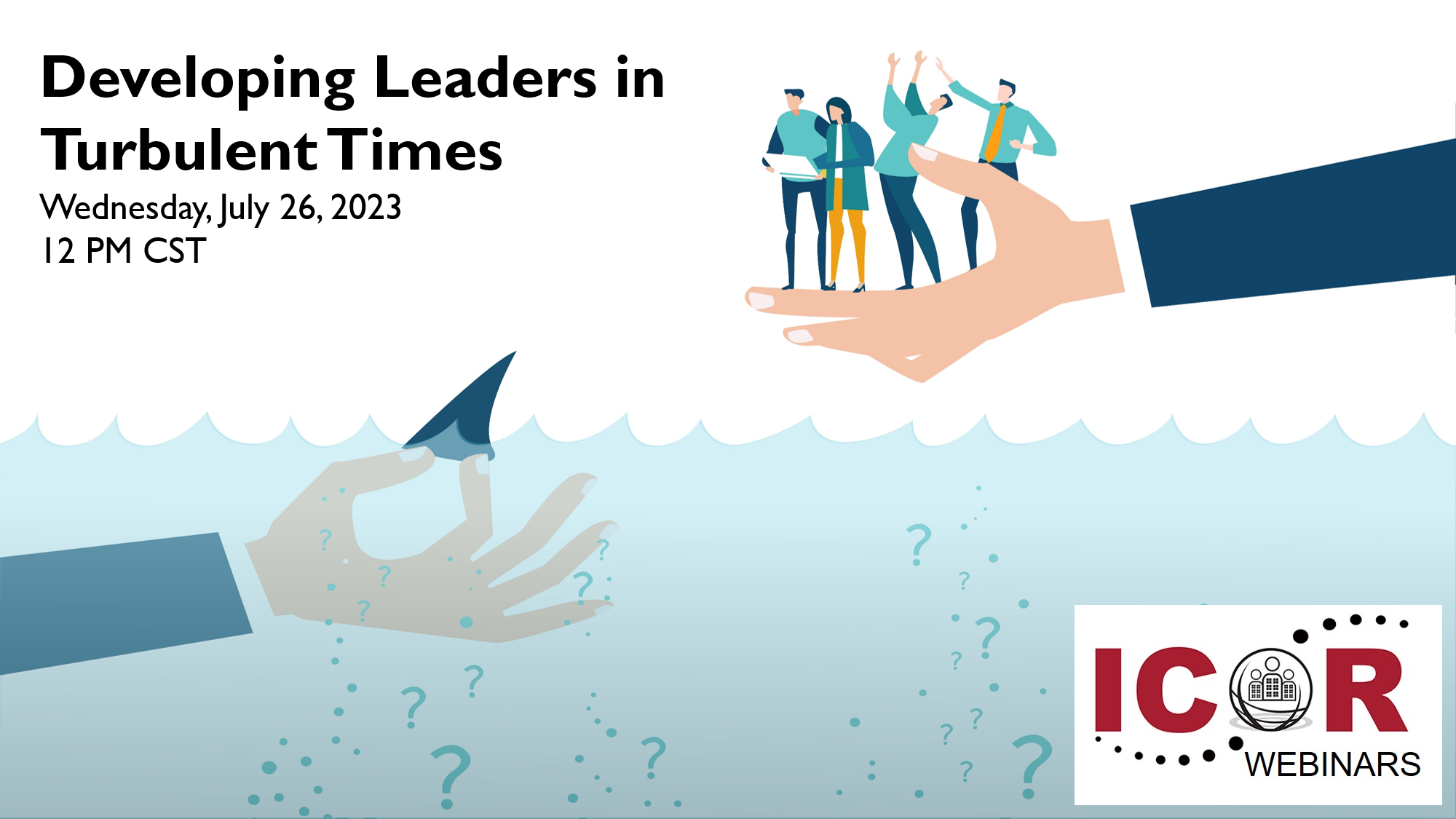
Leadership can make or break an organization’s future, especially in turbulent times. Few strategic challenges are more compelling than identifying, developing and properly positioning the leaders of tomorrow. Successful organizations embed leadership responsibility at all levels, and invest heavily in leadership development.
With the psychological and emotional role that leaders need to play if they are to optimize morale and productivity during turbulent times, it is more important than ever that organizations understand the four leadership behaviors that are critical during times of uncertainty and change.
June 21, 2023 - Moving from Managing Risk to Strategic Resilience
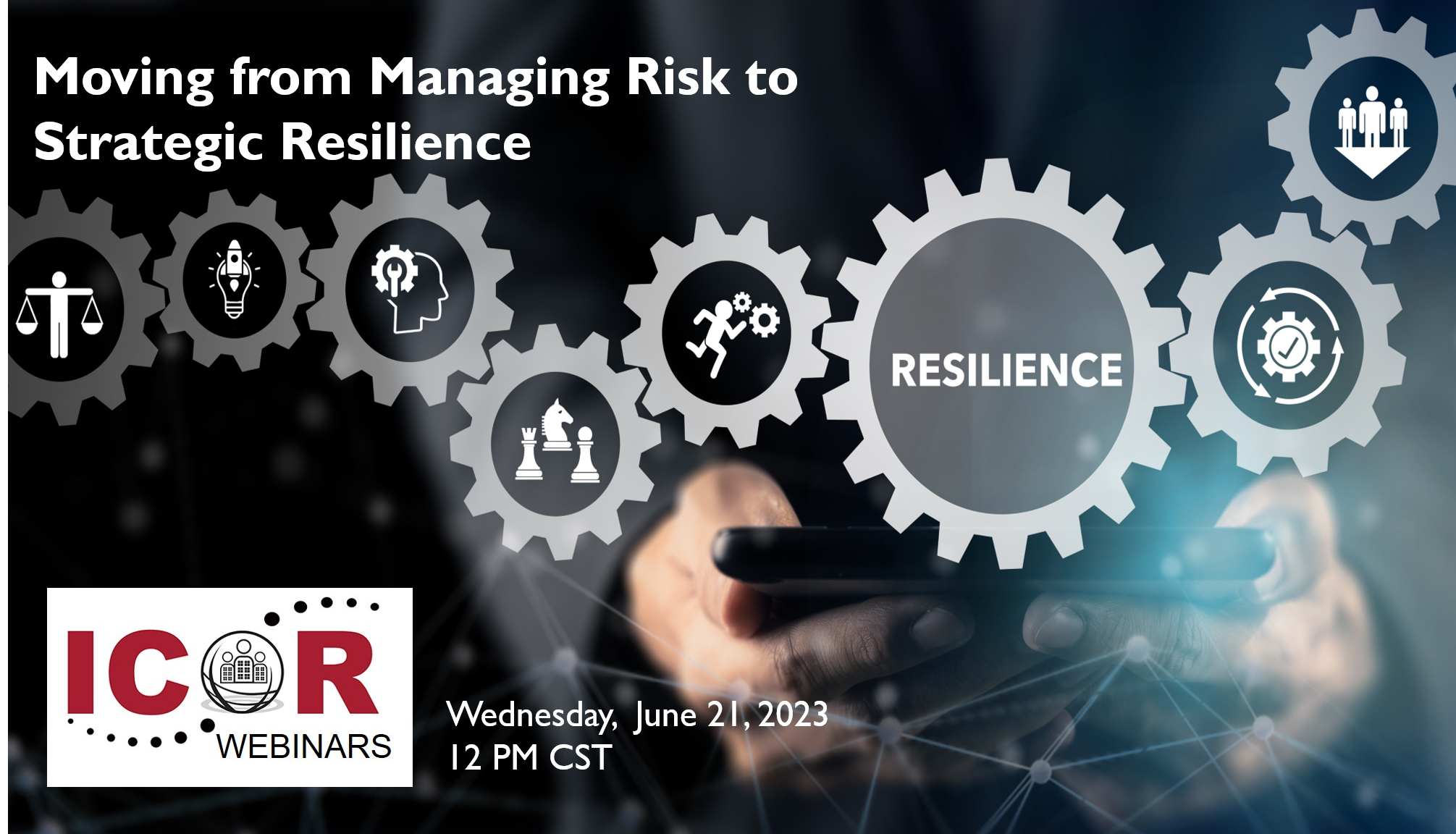
If it’s taught us nothing else, the COVID-19 pandemic has provided the business case for leaders to move from defensive risk management to a forward-looking stance based on strategic resilience. The pandemic crisis has dramatically illustrated the short-sightedness of focusing on a small number of well-defined risks and the need to instead create a long-term strategy to successfully navigate in a world where there is a dynamic pace of change.
Attend this webinar and learn how to move to a broader mandate of integrating the risk function with other core functions to enable a more holistic resilience strategy.
May 24, 2023 - The Role of Cross-Functional Teams in Building Resilience & Agility
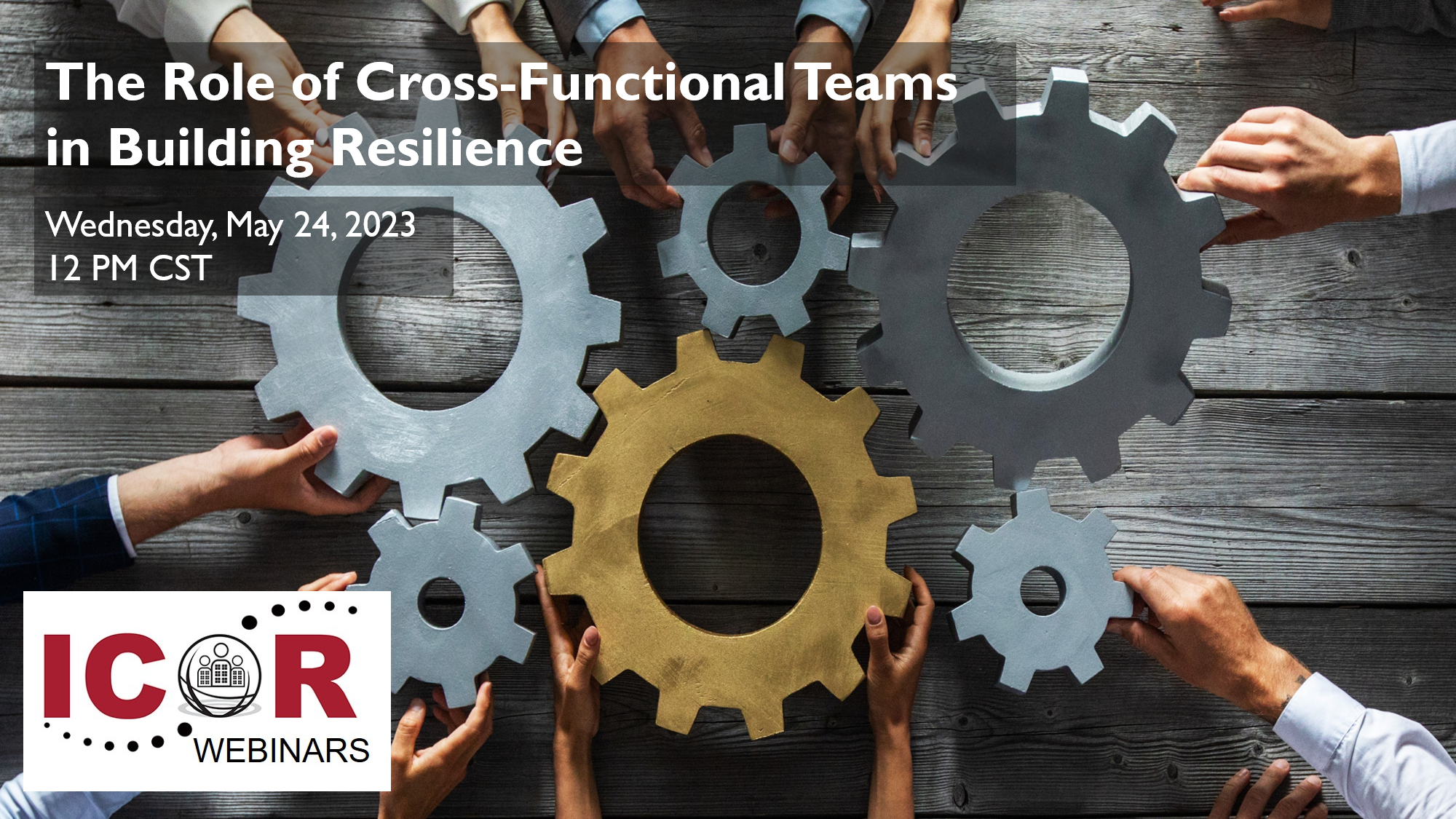
The coming together of minds from different teams and departments allows you to innovate, bring fresh perspectives, and strive towards shared goals. Relying on a single person or group of people to drive innovation excludes the input of different perspectives. Cross-functional collaboration drives progress across business units and departments.
Attend this webinar and learn how to use cross-functional teams to increase engagement, create a sense of purpose, and streamline work processes.
April 19, 2023 - Managing Risk to the Data Center
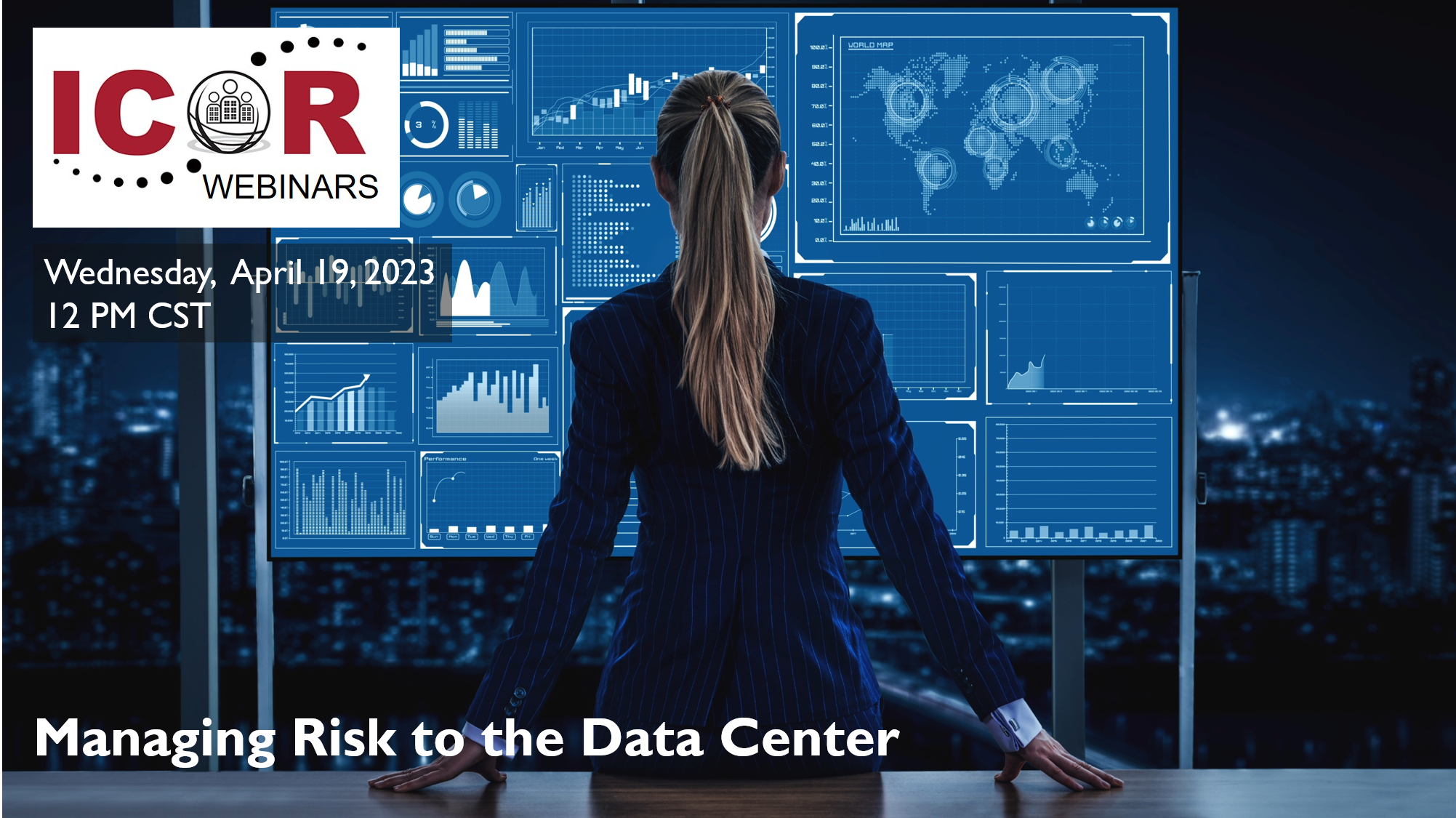
Traditional risk management is no longer an adequate activity to fully understand threats to critical environments such as data centers. With risks including increased demands to power land, and water, combined with supply chain disruptions, managing risk has become much more difficult. The increase in demand for “Everything as a Service” (XaaS) has also complicated this process.
Attend this webinar and learn more about the new risk environment in data centers and other critical environments.
March 29, 2023 - Implementing a Unified Incident Response Structure
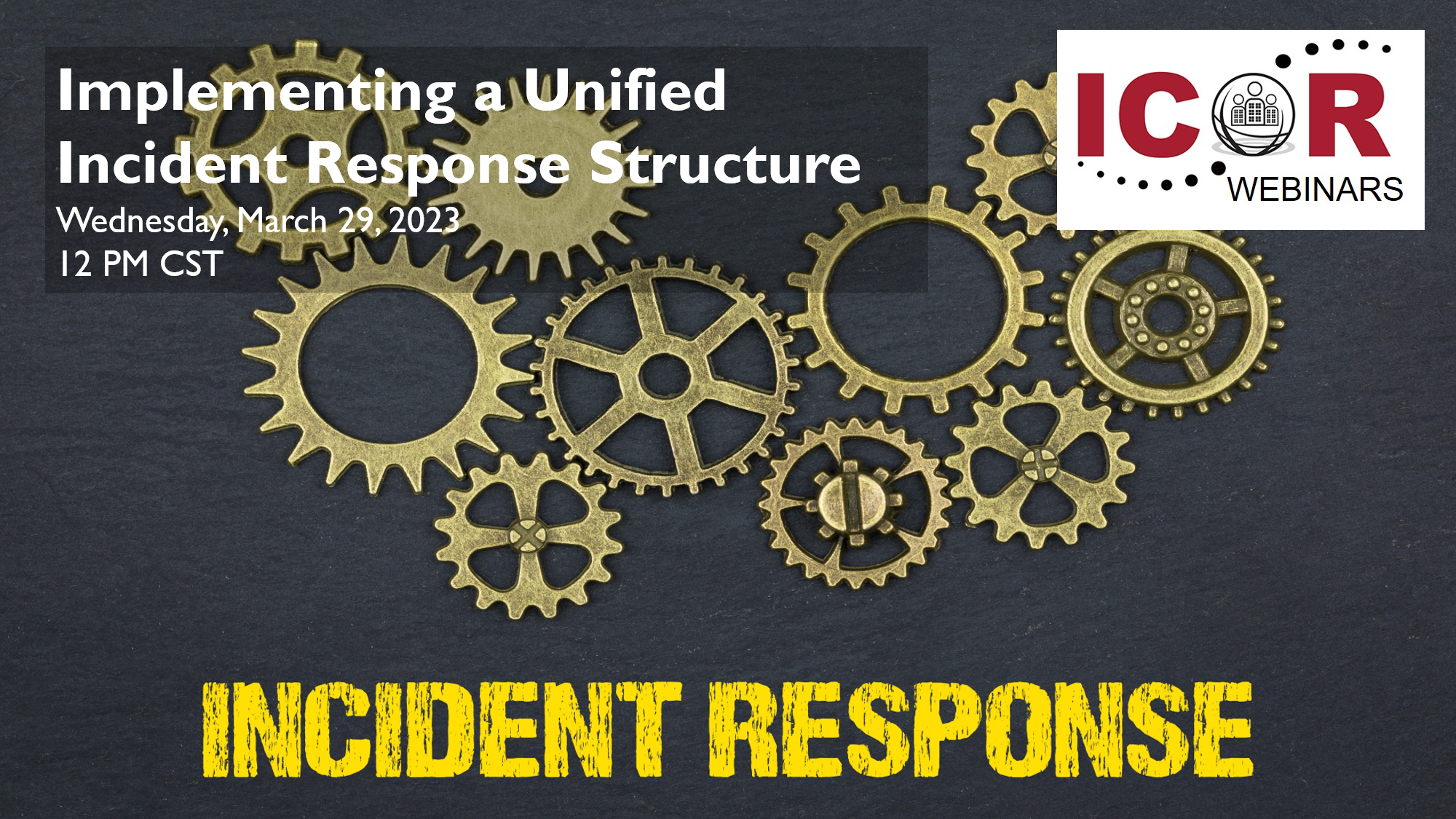
An incident response capability can be applied to any function within an organization as well as when the incident requires shared response between organizations, between organizations and government, and between governments.
Attend this webinar and learn how to build an incident response capability that can be applied to any function and across multiple functions within an organization ensuring it operates as a single unified response system.
February 22, 2023 - Managing Reputation Risk
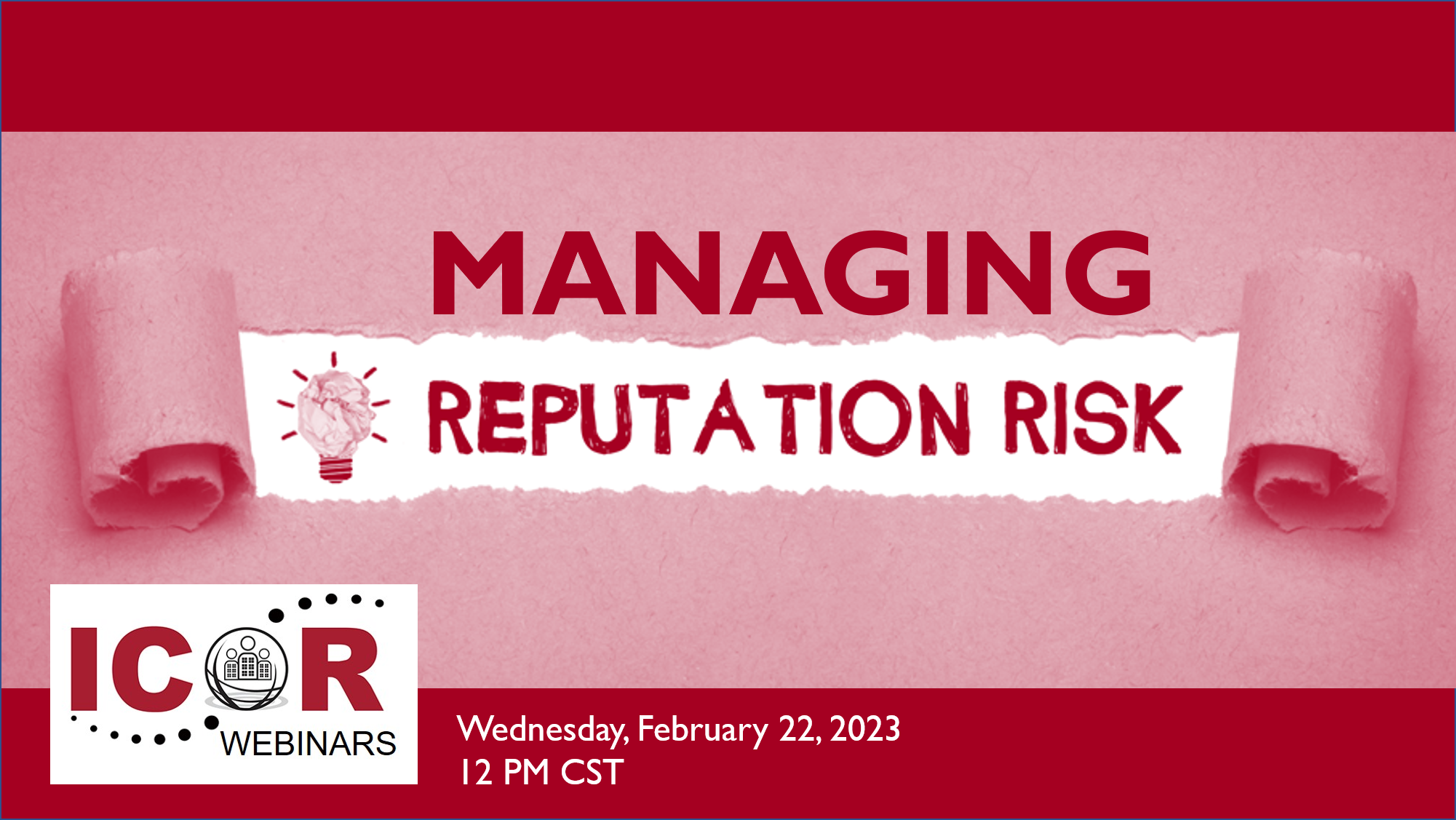
An organization in crisis faces many grave threats. Employees can be in physical danger. Buildings can fall. Customers can be lost. But the most serious threat is and always will be the threat to the organization’s most important asset – its reputation.
To protect the organization from reputation threats requires careful, thoughtful, detailed planning and a methodology for inculcating a culture of crisis preparedness.
In this webinar, you will learn how to prepare the organization for inevitable threats to reputation, execute the crisis communications plan, then, when the crisis has passed, assess and do what must be done before the next threats occur.
January 25, 2023 - ISO 27001: 2022 Information Security, Cybersecurity and Privacy Protection - Protecting the confidentiality, availability, and integrity of your organization’s information security assets

The world is facing new evolving security challenges and the updated ISO 27001:2022 standard published in October 2022 reflects those challenges by aiming to protect the confidentiality, availability, and integrity of organizations’ information assets. The new version’s complete title is ISO/IEC 27001:2022 Information Security, Cybersecurity and Privacy Protection.
Attend this webinar to learn about the changes to Annex A and updates of its clauses and how to use it to prove the strength of your security posture to prospects and customers in global markets.
December 14, 2022 - Building a Crisis Management Capability
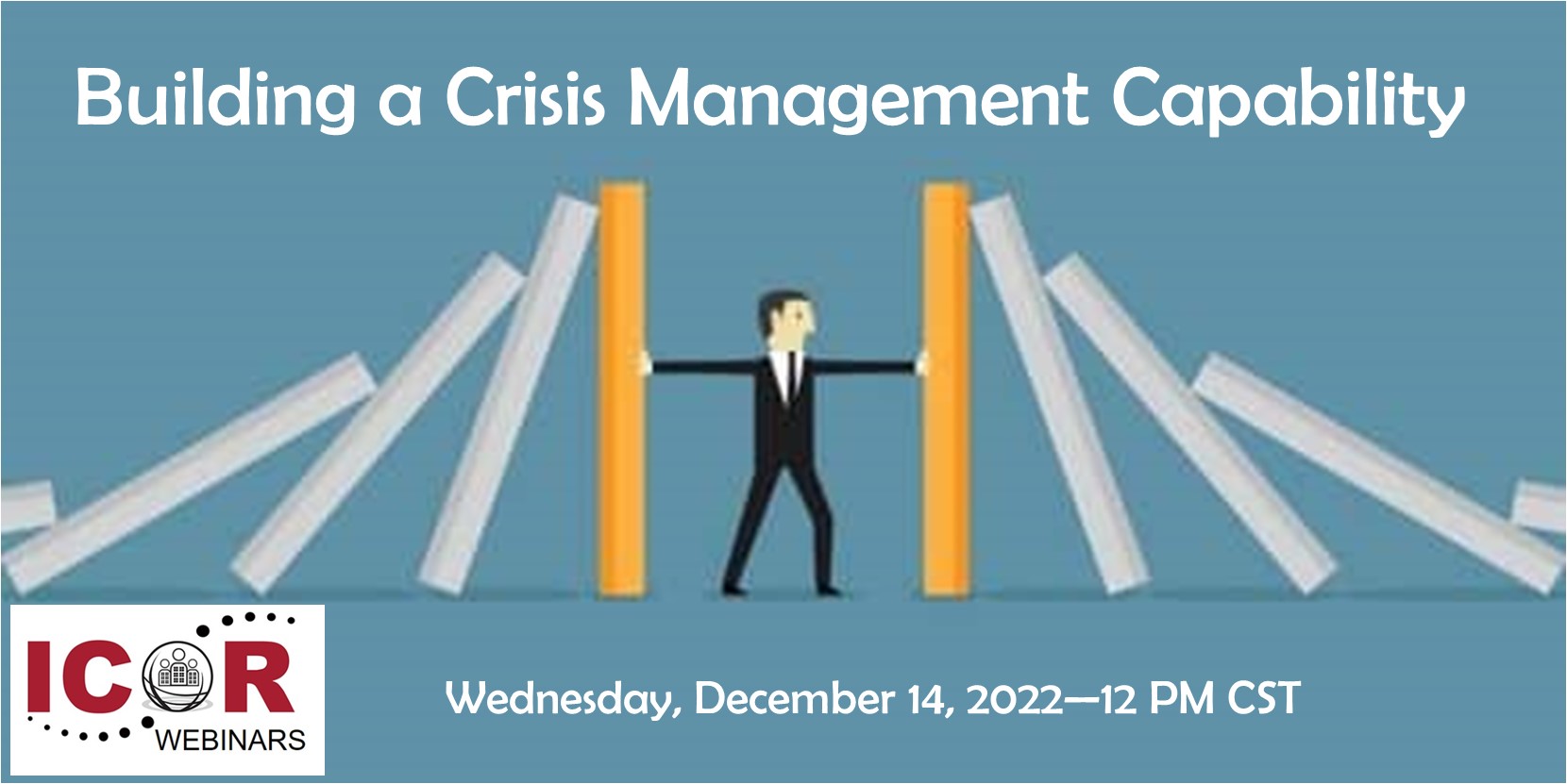
A crisis management capability is required to manage the increasing challenges of leading organizations during times of uncertainty. Lessons learned after almost 3 years of managing the changes due to the pandemic, have taught us all the importance of having a strong crisis management capability.
Attend this webinar and learn how to increase your organization's crisis management capability including what should be included in every crisis management and communication plan.
October 26, 2022 - Understanding the Resilience of Your Community - Why Does it Matter?

The global pandemic has demonstrated to us all the importance of resilience community systems. The resilience of your community - large or small - impacted businesses, social systems, health systems, goverments, and public services. And the resilience of each of these systems impacted the people who live there.
Attend this webinar to learn more about the social, environmental, and economic challenges faced by communities and what types of strategic initiatives community leadership should consider in order to ensure they are prepared to meet them.
September 21, 2022 - Measuring Your Organization's Resilience -Sneak Peak at ICOR's Organizational Resilience Capability Assessment
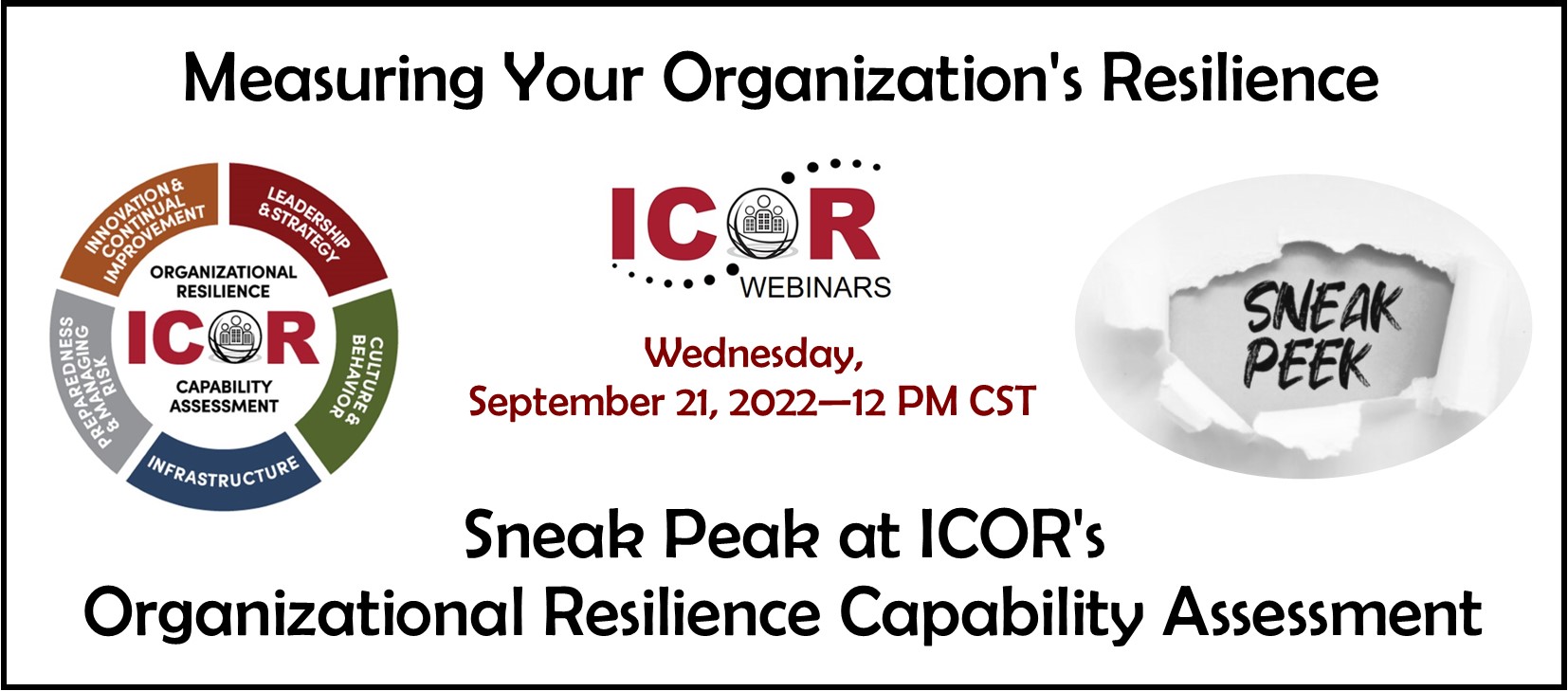
There is a lot of talk in the marketplace about resilience and how to increase the resilience of your organization, but much of it is focused on very narrow aspects - often as a sales pitch where the purchase of a specific product will solve all your problems.
ICOR's Organizational Resilience Capability Assessment (ORCA) was developed to help leaders identify their organization's strengths and weaknesses through a strategic lens and to provide a baseline for determining how to implement specific strategies to increase their capabilities.
Attend this webinar for a sneak peak at the ORCA tool and participate in a "short-assessment" of your organization's strengths and weaknesses.
August 24, 2022 - Identifying & Implementing Strategies to Increase Resilience
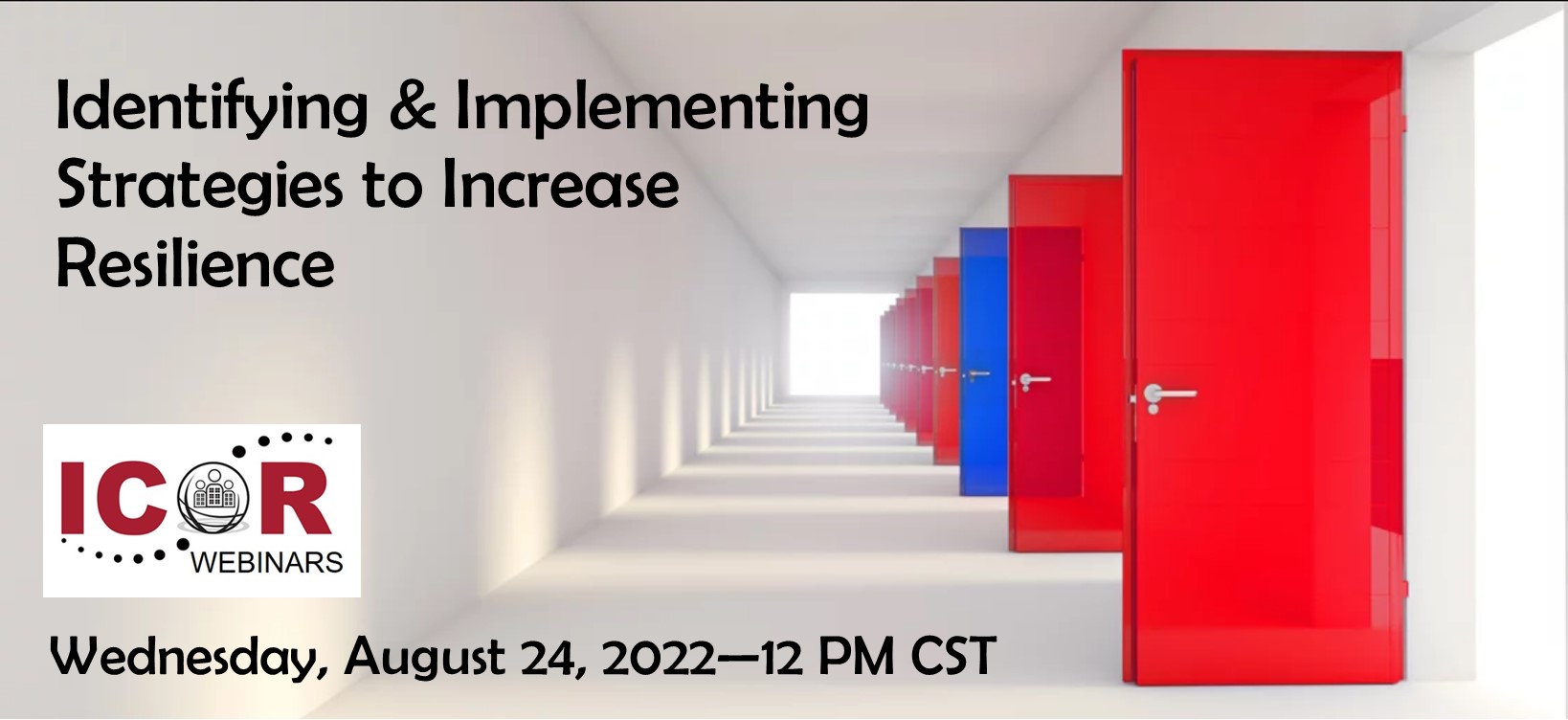
The COVID-19 pandemic has identified the need for organizational resilience to be a strategic initiative supported by leadership at all levels and documented in policy.
The resilience objectives defined in the policy provide the basis for increasing the organization's strategic capability to deliver its objectives and to survive and prosper.
Attend this webinar to gain an understanding of how to design and implement an organizational resilience strategic initiative.
July 27, 2022 - Increasing Resilience Through Diversity and Integration

Diversity and integration have been at the forefront for the past several years in not just building more resilient organizations, but in ensuring a healthier workplace and more inclusive society.
Diversity is best implemented when there exists the opportunity to bring together disparate thoughts and strategies into cohesive solutions and actions. This includes the intentional horizontal and vertical integration of the working environment.
Attend this webinar and learn about how to intentionally recognize the importance of the diverse nature and characteristics of its people and how to implement systems where integration is an ongoing process that takes everyone into consideration.
June 22, 2022 - How Self-Awareness Increases Performance and Improves Culture

Even though self-awareness — knowing who we are and how we’re seen — is important for job performance, career success, and leadership effectiveness, it’s in remarkably short supply in today’s workplace.
When people are self-aware, they understand their strengths and challenges and know what helps them thrive. They also understand that how they see themselves may be different from how others see them. People with strong self-awareness skills recognize other people's needs and feelings, enabling stronger emotional intelligence which results in having healthier relationships. They also have a growth mindset and learn from mistakes - being more reflective in nature.
Attend this webinar and learn how being aware of yourself and others is a key enabler in building a heathly culture both at work and at home. We will discuss how situational-awareness allows you to anticipate future conditions to reduce any potential negative impact. Learn how taking time to reflect and to learn from past experiences informs future decision-making and increases your ability to think beyond your current state.
May 25, 2022 - Being Prepared in all Aspects of Your Life

So often the behaviors of being "prepared, robust, and redundant" are applied to the infrastructure and systems of organizations. However, these behaviors are just as important for everyone to embrace.
Attend this webinar and learn about the importance if intentionally working out the details of a plan of action in advance of it being needed. Consider how you can build robust systems that are well-conceived, constructed, and managed so they can withstand significant impacts without damage or loss of function. Learn how spare capacity can be purposely created so that they can withstand disruption, extreme pressures, or surges in demand.
April 20, 2022 - Collaboration and Inclusion - Enablers of Building Resilience

In a world where the only constant is change, embracing a culture of collaboration is essential for businesses to grow and thrive. Collaboration - and it is a skill that can be learned - is an enabler of true teamwork across an organisation.
Collaboration is an important skill that helps us achieve various types of accomplishments and is crucial to working in an inclusive setting. No matter what the industry, you will improve not only your own performance but the performance of your organization, by effectively collaborating with your colleagues.
Attend this webinar to learn more about how collaboration increases engagement from all of its interested parties, enabling working together towards a common purpose or goal, and a sense of shared ownership or a joint vision to building resilience.
March 16, 2022 - Being Resourceful, Creative, and Innovative "Inside" the Box

Under times of uncertainty and change those people who are able to rapidly find different ways to achieve their goals or meet their needs are happier and more successful than those who are not.
Being resourceful, creative, and innovative provide the capability to transcend traditional ideas, roles, and patterns in order to create something new. They leverage originality of thought and demonstrate imagination to meet challenges in their lives at home and at work.
Attend this webinar and learn how organizations that foster creativity and innovation by seeking out and promoting new and innovative ideas are able to not only achieve their objectives, but to survive and prosper.
February 23, 2022 - Adaptability & Flexibility - Key Ingredients in Resilience

As Charles Darwin once said, "It is not the strongest of the species that survives, nor the most intelligent that survives. It is the one that is the most adaptable to change." Ultimately, there is no tool more powerful for survival than our ability to adapt.
We all experience ever-increasing uncertainty and change. The organization and its people must have the ability to change, evolve, and adapt in response to changing circumstances and have the ability to apply existing resources to new purposes in order to survive and thrive.
Attend this webinar and learn how to be more flexible and adaptable and to understand what kind of mechanisms should exist allowing organizations and its people to continuously evolve and to modify their activities rather than seeking solutions based on the status quo.
Webinar Objectives
- Understand the how to increase your skills in adaptability and flexibility
- Learn how to be more adaptable and flexible in your response to change
- Consider how to apply this knowledge to hiring and professional development practices
January 26, 2022 - Individual Resilience - Where Organizational Resilience Begins
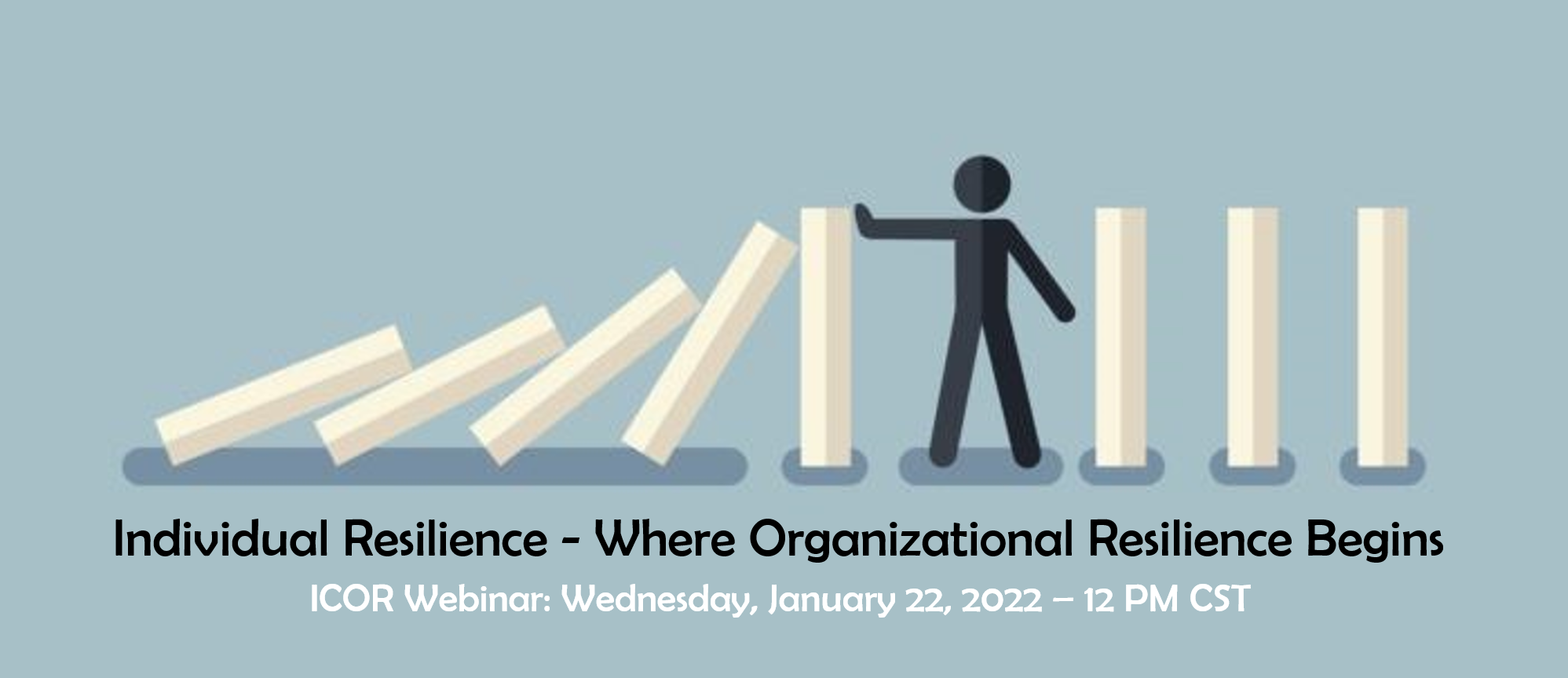
This webinar will serve as an introduction to the ICOR 2022 webinar series on the skills, knowledge, and behaviors present in people who are able to thrive in the midst of constant change.
Resilience is not something you were born having - it's built from the hundreds of daily interactions you have with the world. Attend this webinar to learn about the science of individual resilience and how you can learn to be a more resilient person and how organizations can identify the behaviors it requires to be more resilient.
Webinar Objectives
- Understand the science of individual resilience
- Learn how to build resilience skills, knowledge, & behaviors
- Consider how to apply this knowledge to hiring and professional development practices
December 15, 2021 - How Culture Shapes Behavior to Build More Resilient Organizations
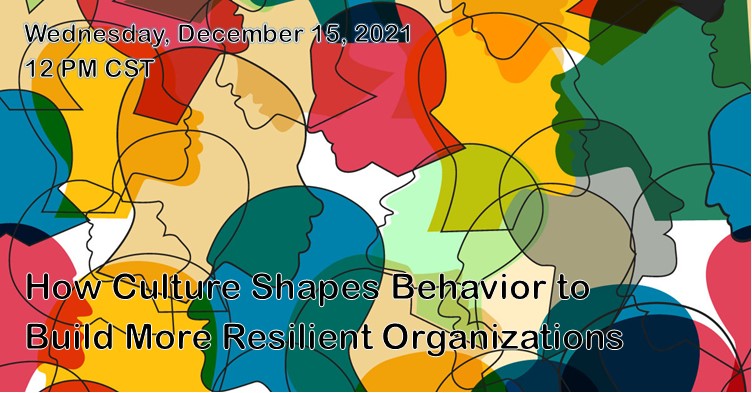
The cornerstone of any organizational resilience strategy is the organization's culture. It requires a commitment to building a more resilient organization and is dependent upon the existence of shared beliefs and values, positive attitudes, and behavior. Because culture provides a sense of identity to its people and reinforces the values of the organization, it serves also as a control mechanism for shaping behavior. This webinar will review the cultural attributes visible in more resilient organizations what leaders can do to foster a culture that supports its vision and mission.
November 17, 2021 - Minimizing Risk to Global Value Chains

In a world where hazards are occurring more frequently and causing greater damage, companies and policy makers alike are reconsidering how to make global value chains more resilient. Even before the COVID?19 pandemic, a multitude of events in recent years temporarily disrupted production at many companies.This webinar will explore the key findings of McKinsey's study entitled, "Risk, Resilience, and Rebalancing in Global Value Chains".
October 20, 2021 - Risk Culture and Operational Resilience
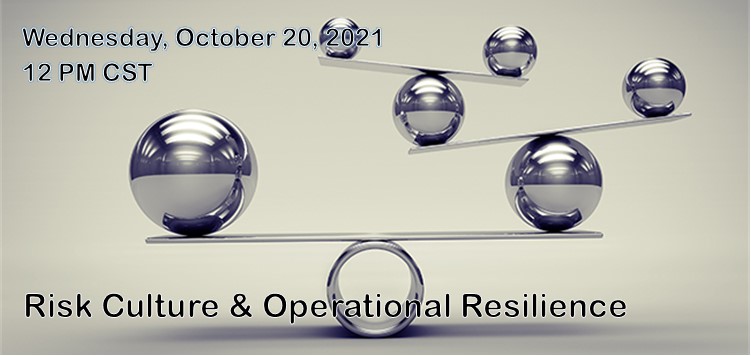
Risk culture refers to the mindset and behaviorial norms that determine how an organization identifies and manages risk. A healthy risk culture is more important than ever in a postpandemic world. Long term a healthy risk culture is a critical element of resilience against risk. A healthy risk culture is also an enabler of more dynamic and flexible risk management. This webinar will explore how to set up an effective risk culture program and how to build a more dynamic and flexible approach to managing risk and increasing operational resilience.
September 29, 2021 - The Impact of Individual Purpose in Managing Postpandemic Uncertainties
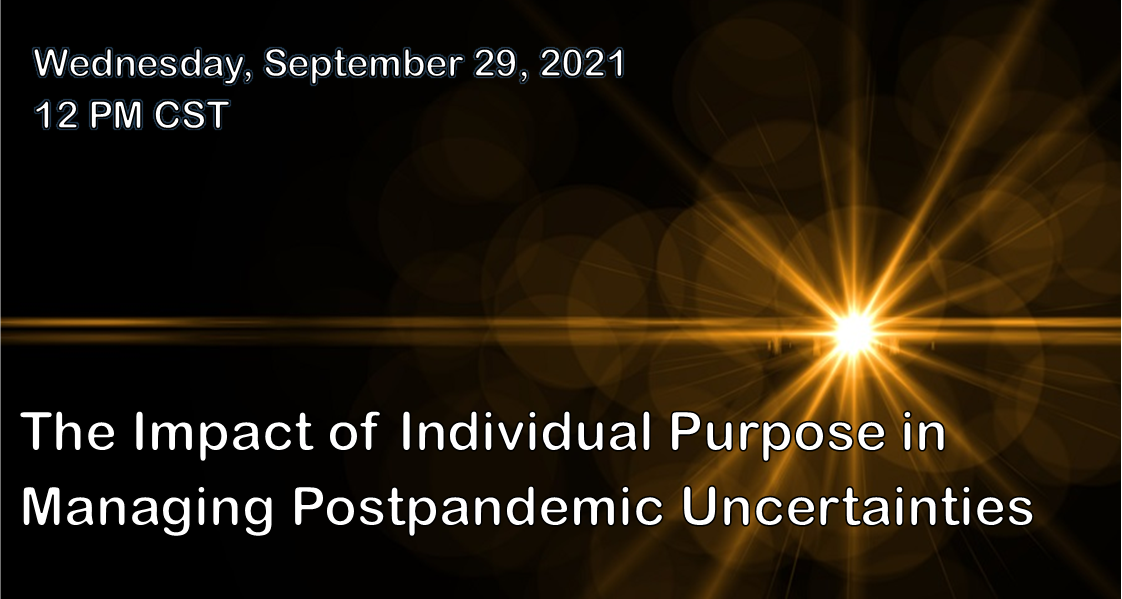
A core attribute of an organization's resilience is an understanding of its vision and purpose. A critical component of this understanding is the impact of the purpose of of its people. In this webinar we will review the results of research into the intersection of organizational purpose and individual purpose and how the two interact and fuel each other as part of the employee experience. An understanding of these two aspects could prove to be vital in managing the postpandemic uncertainties that lie ahead.
September 22, 2021 - Effective Scenario-Based Crisis Communication Training
No crisis response is complete without timely, truthful, consistent, and coordinated communication with internal and external stakeholders. A botched communication response not only leads to increased traditional and social media coverage and stakeholder scrutiny, but it may cause lasting damage to brand equity, reputation, and the bottom line. Preparation is key to successful crisis communication and involves the development and implementation of a customized Crisis Communication Plan (CCP), 24/7/365 Internet and Media Monitoring, and recurring Crisis Communication Training.
Join strategic communication and crisis management expert Oliver S. Schmidt as he discusses why Crisis Communication Training should be scenario-based and tailored to fit the needs of the company and the training participants. On-camera media interview, news conference, and social media practices are critical training components that enhance spokesperson skills, foster Crisis Response Team (CRT) member learning, and increase crisis readiness. A growing number of companies across industries acknowledge the value that recurring Crisis Communication Training provides and make it available to managers from various business functions and locations.
Oliver S. Schmidt is the President and CEO of C4CS®, an international management consultancy headquartered in Pittsburgh, Pennsylvania, USA. He has more than 25 years of consulting, training, and executive coaching experience in the areas of strategic communication, crisis management, organizational leadership.
A multi-lingual executive who has lived and worked in North America, Europe, and Asia, Oliver routinely advises senior leaders including the CEOs and members of the board of directors of publicly listed and privately held corporations regarding high stakes business issues. His consulting work focuses on providing guidance to domestic and international client partners in the areas of issues and stakeholder management, repu
August 18, 2021 - Building Agility and Flexibility in Real Time - Agility Across the Entire Organization

The time is now - what are you waiting for? Research is showing that organizations that had launched agile transformations pre-COVID-19 performed better and moved faster during the pandemic that those that had not. Agile organizations have had an edge because they already had processes and structures in place that allowed them to adapt, adjust faster, and do so with less employee turmoil. Attend this webinar and learn how to implement agile best practices into everyday operations.
July 21, 2021 - Capability Building - Getting Learning Programs Right

Skills can and do expire. In addition to skills, organizations need people who can continually learn and adapt quickly. They need people who are open to new experiences and flexible in their thinking. This has never been more relevant than during the global pandemic. Attend this webinar and learn how forward-thinking organizations have accelerated their capability-building efforts to ensure its people learn continuously and how HR is central to helping people across an organization adapt to new roles and responsibilities.
June 21, 2021 - Information Security in the Work From Home Era
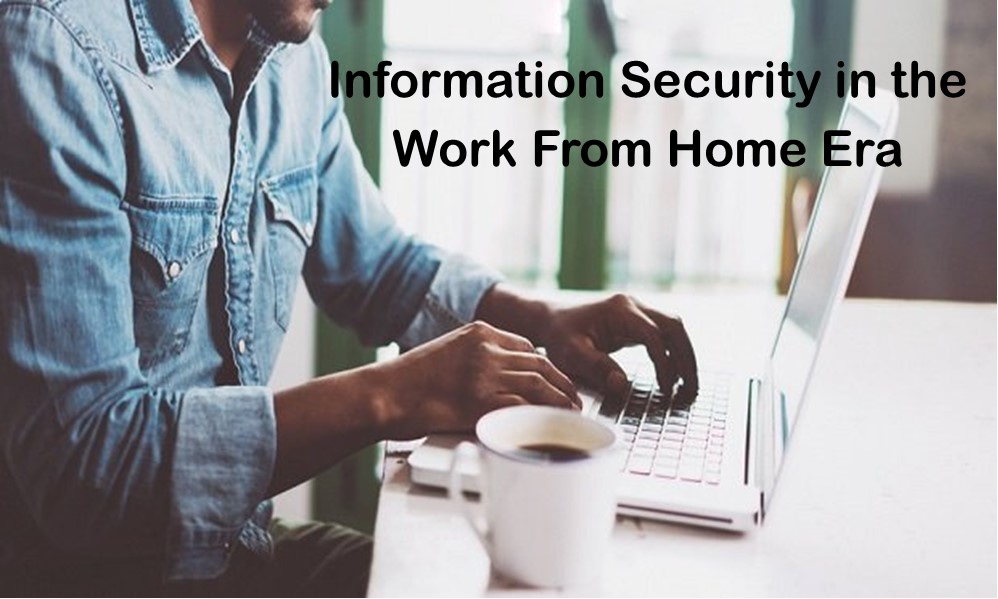
The COVID-19 pandemic has completely changed the way employees work. With that comes key changes in the way IT security is handled. With a decentralized workforce, there is an increased risk of security breaches when information travels among colleagues. In this webinar, Intertek experts Charlie Clark and Jim Nelson break down the risks in a remote workforce and the steps companies need to take in order to ensure a safe, secure network.
Objectives
- Learning the effects of the pandemic on IT security
- Understanding how to mitigate risk with a remote workforce
- Highlight key blind spots in IT security companies might face when maintaining a remote workforce
June 16, 2021 - Resilience is More Than a Plan - It is a Strategy

2021 will differentiate the resilient from the not-so-resilient organizations. Organizations that focus on building sustainable capabilities as a strategy instead of plans for returning to normal, will emerge stronger from the pandemic than those that don't. Attend this webinar and learn how you can contribute to building your organization's sustainable capabilities as part of building a more resilient organization.
May 19, 2021 - Reimagining the Postpandemic Workplace

Understanding where your people work most effectively impacts the physical places needed to do the work of the organization. This understanding has changed based upon the changes implemented in 2020. Organizations world-wide need to consider how permanent these changes are and how they may impact the organization long-term. In this webinar we will review different workplace models and their pros and cons.
May 5, 2021 - Effective Internet & Media Monitoring in the Context of Crisis Management

The stakes are high in today’s Information Age. It has never been more important to stay informed about what is on the internet and countless media channels present around the globe. More and more often, organizations only have moments to learn about and respond to internet and media content that could seriously impact reputation, stakeholder trust, and the bottom line. As a result, technology-driven, 24/7/365 internet and media monitoring plays a critical role in optimizing crisis readiness and response. Utilizing customized monitoring search terms, regular reporting, and red alerts significantly contributes to effective crisis prevention, crisis preparedness planning, and overcoming business challenges.
Join strategic communication and crisis management expert Oliver S. Schmidt as he discusses why internet and media monitoring markedly enhances organizational resilience and how a growing number of companies across industries are implementing comprehensive internet and media monitoring solutions in 2021.
April 21, 2021 - Reimagining the Postpandemic Workforce

Remote working has become the norm during 2020 - to what extent will it continue? As organizations reimagine the postpandemic organization, the impact of how the workforce returns to work and determining when remote work "works" and when it doesn't, is top of mind. In this webinar we will discuss the positive and negative aspects of remote working and factors to consider when building a more resilient and flexible workforce.
March 24, 2021 - Rebuilding for Speed in the Postpandemic Era
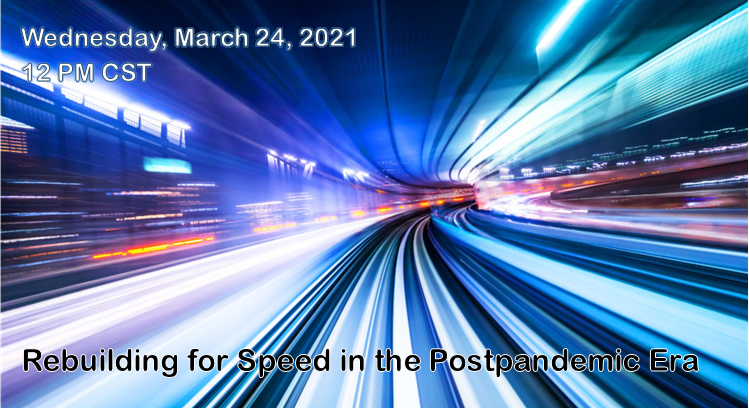
As a result of the global pandemic, organizations have removed boundaries and have broken down silos in ways no one thought was possible. Decisions and processes have been streamlined, frontline leaders have been empowered, and hierarchies and bureaucracies dismantled. Attend this webinar to learn why we can't "return to normal", but need to create a new normal that results in rethinking ways of working, reimagining structure, and reshaping talent.
February 17, 2021 - Leading in Uncertain Times

The COVID-19 pandemic and the resulting economic recession have affected most large organizations around the world. Leaders continue to scramble to address rapidly developing changes in the public-health environment, public policy, and customer behavior. And then there is the economic uncertainty. Due to the severity of this crisis, many organizations are in a struggle for their very existence. In this webinar we will explore the relationship between the duration and magnitude of a crisis and how understanding this relationship will help leaders to overcome these challenges and respond continuously to dynamic change.
January 27, 2021 - Recovering from the Global Pandemic
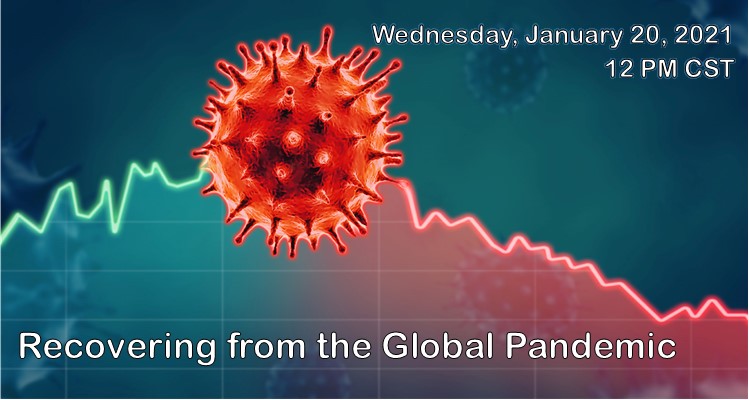
"When will this be over?" Organizations most often plan for recovering from a natural disaster or a fire, or other more "normal" crises. But how do we recover from a global pandemic? How do we overcome pandemic fatigue? How do we reenergize an exhausted organization? In this webinar we will discuss strategies for leaders to avoid burnout and prevent pandemic fatigue.
December 18, 2020 - Cyber Resilience: The shield for cyberspace
Due to this natural coexistence in the digital world, it is necessary to develop skills related to protection and cybersecurity and cyber recovery. This includes measures and controls that include the business/IT interruption scenario into the DRP capabilities and technologies required, such as hyper convergence, forensics, back in time data recovery, sync of different time frames data, vault, airgap, etc.
- What is cybersecurity and its elements or domains?
- Introduction to the cybersecurity management model.
- Good practices in the development of web applications
- How do I recover from a cyber-attack?
November 18, 2020 - Measuring Organizational Resilience

Attend this webinar and get a sneak peek at ICOR’s Organizational Resilience Capability Maturity Model. Based on ICOR’s Organizational Resilience Framework and its Organizational Resilience Model, the OR Capability Maturity Model identifies capabilities across 5 maturity levels and 5 competency areas. Learn how the OR Capability Maturity Model can be used to measure your organization’s level of resilience and to plan strategies to increase its capabilities.
October 14, 2020 - Crisis Management in a Pandemic World

The coronavirus pandemic has not only brought more and new challenges to crisis management professionals but has also renewed the focus on comprehensive crisis management planning, testing and execution. Join seasoned disaster and crisis response expert Tom Serio as he outlines what the “new normal” will likely be, including work locations, re-evaluating your BIA data, enhancing your response plans and the complexities the pandemic brings when occurring with other disasters.
September 16, 2020 - Putting Agile into Performance Management

What can those responsible for measuring organizational performance learn from Agile Performance Management? Monitoring, measuring, analyzing, and evaluating how well the organization’s management systems meets the requirements of an international standard is oftentimes an “annual” activity that misses the mark when it comes to taking advantage of opportunities for continual improvement. Attend this webinar and learn how to create a dynamic performance evaluation process that can evolve and adapt according to a changing environment focused on continual improvement.
August 24, 2020 - Effective Employee Communication in the Time of Covid-19
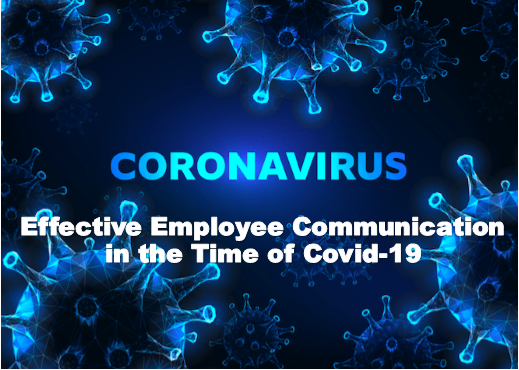
A botched COVID-19 communication response not only leads to unwanted stakeholder scrutiny, but it can cause significant physical and emotional harm as well as lasting damage to stakeholder trust, reputation, and the bottom line. While pandemic related information needs are extensive across all stakeholder groups, catering to the information and communication needs of employees is especially important. Join strategic communication and crisis management expert Oliver S. Schmidt as he discusses why employee communication must increase in volume and frequency and how to effectively inform, educate, motivate, and empower employees.
August 19, 2020 - Understanding the Facility Operations Maturity Model for Data Centers

An operations & maintenance (O&M) program determines to a large degree how well a data center lives up to its design intent. The comprehensive Schneider Electric Data Center Facility Operations Maturity Model (FOMM) is a useful method for determining how effective that program is, what might be lacking, and for benchmarking performance to drive continuous improvement throughout the life cycle of the facility. Attend this webinar to gain an understanding of how implementing the FOMM enables on-going concrete actions that make the data center safer, more reliable, and operationally more efficient.
July 15, 2020 - Strategies to Increase Supply Chain Resilience

All supply chains face risks. The more complex and global those supply chains, the greater their exposure. If something can go wrong, it probably will. There are different parts of your organization for managing risk to its supply chain, ensuring continuity of its supply chain, and improving the security of its supply chain. Each of these aspects is essential to increasing the overall resilience of the supply chain, but they are all too often done in silos, duplicating efforts, and missing important elements that fall between the silos. This webinar will review how you can ensure strategies exist to manage supply chain risk, continuity, and security.
June 10, 2020 - Hackers, #Hashtags & Health Emergencies: Does Your Crisis Communications Plan Reflect Today's Reality?

This session, delivered by former journalist and now award-winning global crisis communications consultant and pandemic planning specialist, Suzanne Bernier, will look at the evolution of crisis management and crisis communications over the years. Recent case studies and lessons learned will be reviewed, highlighting some of the challenges and successes companies and communities have faced along the way. Suzanne will also review traditional tips and tools required to ensure your organization communicates effectively throughout the COVID-19 pandemic, or any crisis, while avoiding any reputational damage or additional fall-out that could arise.
May 27, 2020 - Insights from an ISO 22301 3rd Party Auditor

Are you wondering how to implement the changes to ISO 22301: 2019? How to demonstrate conformance? Gain insight and knowledge from a global 3rd party ISO 22301 Auditor who has conducted audits not only from around the world, but in almost every business sector and industry.
Come prepared for this unique interactive webinar where you have the opportunity to submit your questions ahead of time and have them answered online!
April 29, 2020 - Risk Management Principles and Practices

To what extent is the management of risk effectively implemented throughout your organization? Is risk management owned by a few or is the management of risk embedded in the responsibility of everyone? Attend this webinar and learn how to identify sources or types of risk, evaluate which risk identification methodologies will work best for you, how to analyze risk impacts, and to better understand how effectively managing risk is essential to increasing your organization’s resilience.
March 25, 2020 - Why Knowledge Management Matters

Does your organization practice knowledge management? Do you have a way to measure the knowledge that “walks out the door” when good people leave? Knowledge management, when implemented as a discipline, enables the sharing of information and knowledge to enable effective decision-making, learning from experience, and from others. It also addresses the reduction of organizational vulnerability. Attend this webinar and learn how to successfully implement knowledge management at your organization as one way to increase its resilience.
February 26, 2020 - Ensuring ICT Continuity

It is time to focus on Information and Communication Technology (ICT) Continuity so that we don’t have to spend so many resources on IT “Disaster Recovery.” Attend this webinar and learn how to meet IT challenges, manage IT risk, ensure ICT Service Continuity, and strengthen Technology Recovery when necessary.
January 29, 2020 - The Agile BIA

The Business Impact Analysis (BIA) is the cornerstone of any Business Continuity Management System (BCMS). As an essential component of the data gathering process, providing analytics that are not just relevant but timely should be a part of everyday operations – not a stand-alone project completed every 3 to 5 years. Attend this webinar and learn how to incorporate “agility” into the BIA process.
November 13, 2019 - Improving Data Center Efficiency
As a significant capital investment, data centers are often under the microscope when it comes to improving performance. Within the industry, there is little doubt that data centers need to run as efficiently as possible to avoid tying up valuable (and often, unnecessary) company resources.
Attend this webinar and learn about the latest trends in improving efficiency without compromising performance.
September 25, 2019 - Managing Risk Through the Implementation of Management Systems
Managing risk should be implemented organization-wide, eliminating silos, and operating as one system. However, more often than not, risk management is conducted by different parts of the organization by different entities with little or no oversight.
Attend this webinar and learn how the implementation of management systems can be one tool to eliminate these silos.
August 28, 2019 - High Availability vs Disaster Recovery
There continues to be a great deal of confusion between high availability (HA) and disaster recovery (DR). Both are considered business continuity solutions and both work to ensure availability. But if you operate a high available workplace do you need disaster recovery?
Attend this webinar and learn why both high availability and disaster recovery both have a role to play in the continuity of the IT organization.
July 17, 2019 - Building Resilient Communities - Recent Research
June 26, 2019 - The Agile Organization
It's not your father's company. An Agile Organization is one that is quick in responding to changes in the marketplace or environment. ... A highly agile organization reacts successfully to the emergence of new competitors, rapid advancements in technology and sudden shifts in overall market conditions.
Attend this webinar and learn how agile organizations are transforming the workplace and are predicted to be leaders in long-term performance.
April 18, 2019 - Data Center Capacity Planning
March 20, 2019 - Required Competencies to be a Leader in Organizational Resilience
The ICOR Organizational Resilience Competency Model identifies what it takes to be a Leader in Organizational Resilience—across the performance continuum; around the globe; and across all career levels, job roles and job functions.
ICOR has identified 25 core competencies that answer the question, “What do you need to know to increase the resilience of your organization?”
ICOR’s unique certification recognizes the capabilities of those who lead in increasing the resilience of their organization. It credentials personnel who understand two or more of the disciplines that build a more resilient organization. ICOR provides two paths for applicants to earn the CORM, CORP, or CORE credential.
Attend this webinar and learn how you can earn this valuable certification and use it to grow professionally.
February 20, 2019 - The Impact of Culture on an Organization's Resilience
It is difficult to overestimate the importance of organizational culture and its impact on the resilience of an organization. This webinar explores the role organizational culture, identifies characteristics of resilient organizations, and shares examples of how organizations have improved their culture and increased their resilience.
January 23, 2019 - Data Protection - 2019 Trends & Beyond
December 12, 2018 - Reputation Management
An organization in crisis faces many grave threats. Employees can be in physical danger, buildings can fall, and customers can be lost. But the most serious threat is and always will be the threat to the organization’s most important asset – its reputation.
Attend this webinar and learn from companies that have done it well and from those who haven’t on how to protect the organization from reputational threats.
November 28, 2018 - Developing a Resilient Workforce
No one can argue today’s workplace environment is becoming more turbulent. In the midst of this hectic arena, employees and management alike are looking for answers to help them improve performance. A workforce that has a diversity of skills, leadership, knowledge and experience is a contributing factor to enhancing the resilience of an organization.
People who are properly selected, motivated, equipped and led will overcome almost any obstacle or disruption. To harness people’s incredible ability to lead and respond during changing circumstances requires a systematic strategy for people selection and people support.
This webinar explores the skills and competencies necessary in a workforce that can ensure effective delivery of organizational objectives in a changing world.
October 25, 2018 - Understanding and Protecting Against Security Breaches
September 26, 2018 - Backing up & Recovering Data
August 22, 2018 - Building an Incident Response Capability
Understanding your organization’s incident readiness involves understanding how it manages everyday “issues” and how it determines thresholds for initiating a more formal response.
An organization’s incident response capability is also impacted by how well it integrates and coordinates the different parts of the organization responsible for responding to an incident. Attend this webinar and about the core components of crisis or incident readiness.
July 25, 2018 - Managing Storage
June 20, 2018 - Understanding Risk Appetite
A clearly understood and articulated statement of risk appetite provides the direction needed to identify acceptable risk treatments and manage risk throughout the organization. When risk appetite is properly understood and clearly defined, it becomes a powerful tool for managing risk. However, thinking about risk appetite is often unclear, definitions can be vague, and the gap between theory and practice can be wide.
This webinar will help you to understand the purpose and importance of the risk appetite statement(s), provide guidance on how an organization's risk appetite should be documented, and how to use risk appetite statements to make strategic decisions on managing risk throughout the organization.
May 23, 2018 - Understanding Critical Environments
Critical environments are now more critical to the health and viability than ever before. Anyone who works in information technology, data centers, call centers, or has any role in ensuring the 24x7x365 availability of technology systems will benefit from this webinar.
Attend this webinar and gain an understanding of how the individual components of a critical environment should work together to ensure continuity of operations.
April 18, 2018 - Issue Management & Crisis Readiness
February 21, 2018 - Measuring Your Alignment to ISO 22301 Business Continuity Requirements
January 24, 2018 - Building a Resilient Supply Chain
Threats to your supply chain and therefore to your organization abound – their likelihood and consequences heightened by long, global supply chains, ever-shrinking product cycles, and volatile and unpredictable market cycles.
Supply chains are increasingly at risk of disruption. It is important for organizations to implement a process for supply chain continuity, manage supply chain risk, and ensure supply chain security.
Attend this webinar and learn how to build a more resilient supply chain.
November 28, 2017 - Increasing Resilience and Compliance with ISO Standards
This webinar will provide an overview of how ISO 27001 and ISO 22301 can be used to enhance organizational resilience programs, processes, and activities in a standardized, transparent, and sustainable manner.
Attend this webinar and learn how implementing ISO 27001 and ISO 22301 can help you demonstrate compliance to the European Union General Data Protection Regulation and the New York State, Department of Financial Services Cyber Security Requirements.
October 25, 2017 - Preserving, Protecting, and Recovering Data
For an organization to be more resilient it must understand the nature of the information it is storing and the value the information has to the organization in order to make the right choices about where and how to store their data.
Attend this webinar and learn how to address IT risk, understand the elements of ICT continuity, and manage your overall technology recovery.
September 27, 2017 - Developing Leaders to Lead Resilient Organizations
Resilience begins with an organization’s leadership setting the priorities, allocating the resources and making the commitments to establish organizational resilience throughout the organization. Managing an incident is a difficult task and leaders must change the way they lead in order to be more aware of potential crises.
This webinar explores leadership qualities that have been shown to support the development of a more resilient organization and discusses those leadership qualities necessary to manage an organization, lead during changing times, and create an environment that is both adaptive and agile.
August 30, 2017 - Managing Risks to the Critical Environment
It is estimated that by 2020, more than 7 billion people and businesses and close to 35 billion devices will be connected to the Internet. Those who design, build, operate, and manage data centers and other critical environments need to be able to manage risk, incorporate change, and be innovative in order to design strategies fit for a digital world.
Attend this webinar and learn practical approaches to managing risks to the critical environment.
July 25, 2017 - The New Era of Crisis Communications – From Traditional to Social Media and Beyond...
During any crisis, communicating effectively to all key stakeholders is key. While there are many ways to communicate to your target audiences during an emergency, both traditional and social media are the most effective ways of pushing out information quickly to as many people as possible during a crisis.
This session, delivered by a former journalist and now award-winning crisis communications consultant, will look at the evolution of crisis communications and how social media is changing the game. The session will also review traditional tips and tools required to ensure your organization can communicate effectively during a crisis, while avoiding any reputational damage or fall-out that could arise.
June 21, 2017 - Implementing ISO 22301
An important component of increasing an organization’s resilience is the implementation and management of a Business Continuity Management System (BCMS).
This webinar will describe the 8 primary elements of an effective BCMS how they are best implemented.
May 25, 2017 - Organizational Resilience Certification
April 19, 2017 - The Impact of National Cultures on Organizational Resilience
As the world becomes more global, businesses and emergency response agencies must learn how to cope effectively with the many cultural value systems and mannerisms encountered outside of your nation.
Understanding the values and traits that are characteristic of other cultures is especially important in resilience and disaster response planning.
Attend this webinar and learn about the importance of observing and understanding cultural differences and gain insight on how to work effectively within other cultures as you design and operate resilience and crisis management programs.
March 22, 2017 - Building Resilient Communities
The resilience of an organization is impacted by the communities in which they reside. An understanding of what makes one community more resilient than another is an important aspect for all organizations to consider.
This webinar will discuss the ICOR Resilient Community Framework and provide insight into the latest research in community resilience.
February 22, 2017 - Increasing the Resilience of your Organization
Organizational resilience is interpreted differently within different geographical contexts and academic disciplines. However, almost all of the studies speak to common characteristics in one way or another, despite their thematic, geographic and sectoral differences.
This webinar will explore ICOR’s new Organizational Resilience Model and updated Framework. It will provide practical examples of how to increase the resilience of your organization and share valuable resources on how to learn more.
October 23, 2024 - Are We There Yet?
Measuring our performance - How are we doing?

Because building resilience must be intentional, measuring your capabilities is an essential part of the journey. It is also impossible to implement strategic objectives effectively without having the ability to measure your current state and where you need to strengthen those capabilities – or to determine what is and what is not working.
The organization should encourage and create a culture of continual improvement across all parts of the organization and commit to validate and continually improve its organizational resilience activities and capabilities.
Attend this session to gain an understanding of how to promote a mindset of continuous improvement by leveraging agile performance management. We will help you answer the question, “How can improve how we evaluate our performance?”
November 20, 2024 - Is This Where We Want to Be?
Is our workplace flexible, productive, and meet employee needs for collaboration?

More and more organizations are adopting a flexible hybrid working model with a balance between office and remote work. This requires an understanding that while the roles can be virtual, certain activities are better done in person.
In an agile workplace, the organization understands how its people like to work, how often they need to interact with others, and how they do their best work. This understanding drives decision-making regarding where the work occurs.
Organizations should also consider the ability of the community(ies) where its facilities operate to meet its needs and expectations. The key questions that should be answered include, “To what extent does your community meet the needs of your organization? and, “Is your community able to provide necessary services?”
Attend this session to learn more about a flexible working model and inclusive collaboration as well as the importance of considering the resilience of the community where you work. We will help you answer the question, “How do we ensure we have the right people working on the right stuff in the right place?”